Archived Blog Posts
3 Criteria for Becoming a Preferred Vendor
2/14/2022 (Permalink)
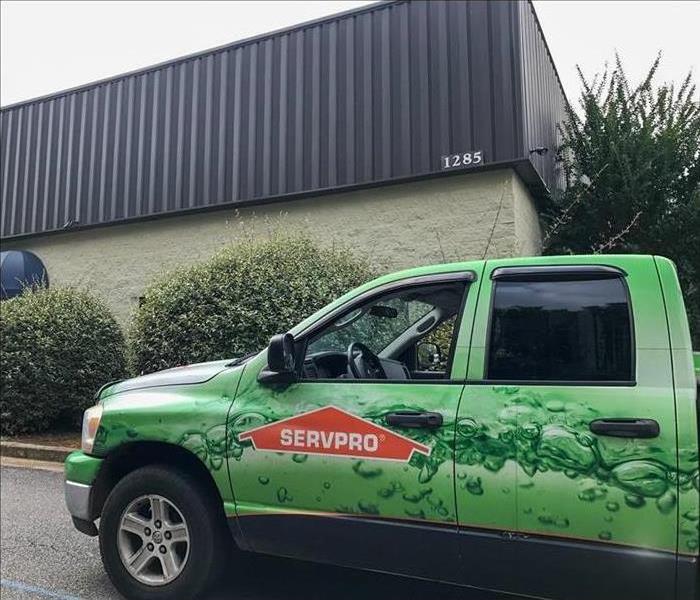 Hiring a preferred vendor can save you time and money in the long run.
Hiring a preferred vendor can save you time and money in the long run.
3 Requirements to Become a Preferred Vendor
When your home in Dacula, GA, is damaged, your insurance agent is going to be one of the first people you call, and a qualified repair company will likely be the next. To ensure that your claim is processed as quickly as possible, it is a good idea to work with one of your insurance company’s preferred vendors. There are several criteria that claims adjusters use to evaluate mitigation companies.
1. Impeccable Record-Keeping
Your adjuster may assess the damage in your home, but when you file the claim, it is important to have an assessment from certified remediation experts. The Claims Information Center at SERVPRO documents everything your insurance company needs to know, including:
- Cause of damage
- Extent of damage
- Estimated repair cost
- Response time
These details are documented electronically and made available for fast release to those who need them. This helps your insurance agent expedite the processing of your claim.
2. IICRC Certification
Your insurance company has a vested interest in ensuring that the restoration to your home is done correctly the first time. Shoddy work can result in more claims filed in the future to repair secondary damage. A vendor that is IICRC certified has the training and experience necessary to provide quality service. Certification indicates to the insurance company that the vendor’s work can be trusted.
3. Referral Guidelines
A mitigation company’s reputation depends on the work of its franchises. In order to receive referrals from the company, a SERVPRO franchise must meet more than 20 guidelines. A company that holds each branch that bears its name to the same high standard is more likely to be an attractive candidate for a vendor program with your insurance company.
Your insurance agent can recommend a mitigation company in your area that is likely to provide you the best service at a reasonable cost. Hiring a preferred vendor can save you time and money in the long run.
5 Flood Preparation Tips for Your Business
2/2/2022 (Permalink)
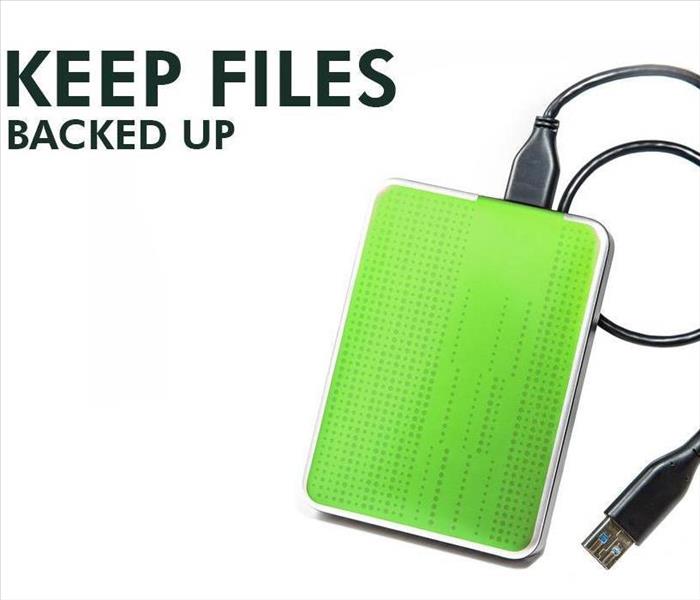 Back up any files.
Back up any files.
Flood Preparation Tips
When it comes to flooding in Sugar Hill, GA, one of the first things you may want to do is protect your business. Fortunately, there are many useful flood preparation tips you can use if you believe your company property may be in danger. Here are a few you may want to consider.
1. Know Your Flood Risk
Knowing your flood risk can help you protect your business from flood damage. Your risk factors include things such as the location of your building, and the type of weather in your area.
2. Keep an Eye on the Weather
It's also important to know what type of weather to expect in your area. If you experience frequent rain or snow you may want to take more permanent measures such as the inclusion of a retaining wall around the property.
3. Back Up Any Files
One unfortunate side effect of flooding is that oftentimes electronics and files can be damaged. You can take precautions by backing up electronic files on a server, and putting paper files away from areas that could be flooded.
4. Protect the Building
If you know a storm is coming you may want to protect your business building from flood damage. Some precautions you can take include boarding over windows, sloping your landscaping away from the building, and moving any furniture or electronics away from doors and windows.
5. Make Repairs Quickly
If your company building is flooded, then you may want to contact a flood damage restoration service as it's important to get in repairs completed as quickly as possible. Not only are quick repairs important for reducing a possibility of additional damage, but they can also help ensure your business stays up and running.
When it comes to flooding, being prepared ahead of time can help you protect your business property. A few helpful tips include knowing your flood rest, keeping an eye on the weather for potential storms, backing up any of your files that could potentially be damaged, and doing what you need to do to protect the property.
Get Ready for a Water Heater Leak
1/26/2022 (Permalink)
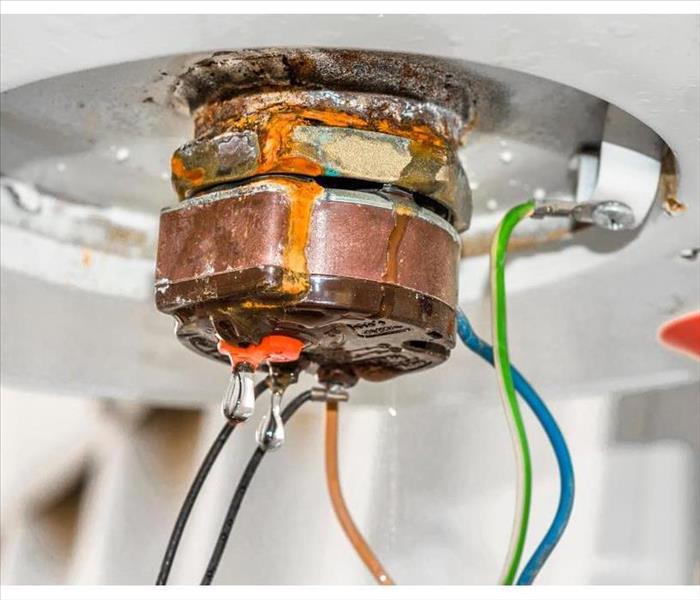 What to do when you have a broken water heater?
What to do when you have a broken water heater?
What To Do When a Water Heater Leaks
A failed water heater can leave a large mess behind, especially if that water tank is tucked in a closet near your main living space. You can minimize damage to your home in Hamilton Mill, GA, by acting fast to clean up the water. Read this now, so you know what to do when the time comes.
1. Stop the Bleed
Stop the water from continually pouring out of your leaking water heater, and reduce the amount of water that leaks into your home.
• Turn off the valve for the cold water pipe that leads into your tank.
• Connect a hose to the drain valve at the bottom of your tank, and redirect the water to an external location to help minimize damage.
2. Call for Help
If your leaking water heater leaves you with a substantial water mess, then calling for help is a good step before you do anything else. Professional water restoration specialists are experienced in resolving floods quickly and efficiently. When it comes to water, a company that is Faster to Any Size Disaster can save you money by reducing the exposure that can cause subsequent damage.
3. Actively Wait
Who says waiting is a passive activity? Even though professionals will come to complete the cleanup and restoration, you can do your part to reduce the damage caused by the leaking water heater. While you wait, you can:
• Remove standing water by absorbing the water with towels and rags or a mop.
• Protect wooden furniture legs by placing foil or blocks underneath the feet.
• Pick up any personal belongings out of the water and place them somewhere else to dry.
• Crank up the airflow by opening windows and doors, using fans or by using your HVAC system to help start the drying process.
You can minimize your exposure to water damage by knowing what to do when you have a broken water heater. Stopping the flow, calling for help and starting some cleanup on your own will all help reduce the amount of time your home is exposed to water. Professional water mitigators will do a thorough job using specialized equipment such as pumps and commercial air movers to remove water fast.
5 Tips for Commercial Fire Safety
1/21/2022 (Permalink)
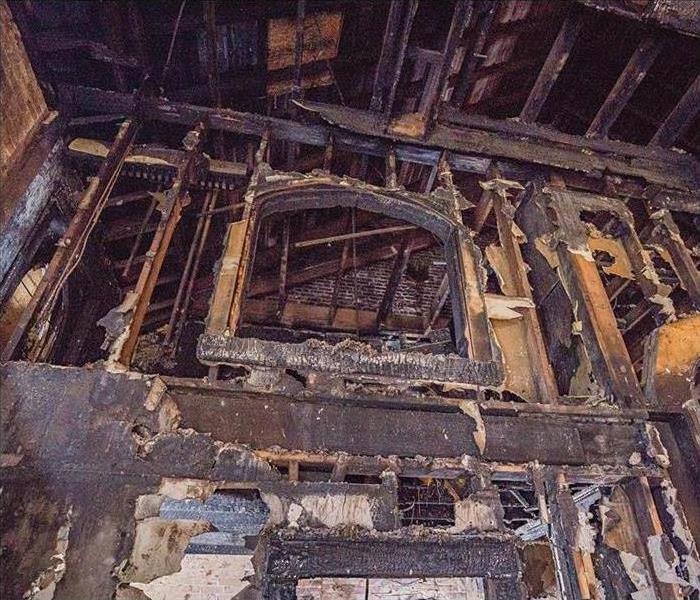 Fire damage in Suwanee, GA.
Fire damage in Suwanee, GA.
Safety Tips In Case Of a Business Fire
As a business owner, the safety of your employees and everyone else in your building in Suwanee, GA, is in your hands. Are you prepared to respond quickly in the event of a business fire? Follow these safety tips to ensure that you can answer that question in the affirmative.
1. Safety Features
Your two main sources of protection during a fire are your fire suppression system and your fire extinguishers. Have your fire suppression system, including alarm panels, fire doors and sprinklers, inspected regularly. Make sure you have enough working fire extinguishers to place one at least every 75 feet and that they are mounted properly.
2. Fire Codes
Your building is bound by both state and federal fire codes. Exits must be properly marked and the pathways to them unobstructed. Electrical plates must be used to cover all wiring so that none of it is exposed. Comply with all laws and make immediate changes when mandated by fire marshals.
3. Material Labeling
All potentially hazardous or flammable material must be stored properly. It is also essential to label liquids that could easily contribute to a business fire so that anyone who sees them knows what they are.
4. Evacuation Plan
Before firefighters can put out the fire and fire damage specialists can restore your building, everyone must vacate it. Having an evacuation plan helps everyone know what they’re supposed to do. This plan should be posted in prominent areas, especially around exits.
5. Evacuation Practice
Even the best plan is useless unless people know about it. Fire drills are a necessary part of fire preparation. Having a drill twice a year helps your employees practice fire safety plan so that they know what to do in case of an emergency.
The best business fire protection is preparation. Keeping your building up to code and enforcing safety measures can help you prevent most fires, and having a workable fire suppression system and evacuation plan can help get people to safety for the fires you can’t prevent.
SERVPRO of Buford/Suwanee/Hamilton Mill - Proud to be awarded
1/20/2022 (Permalink)
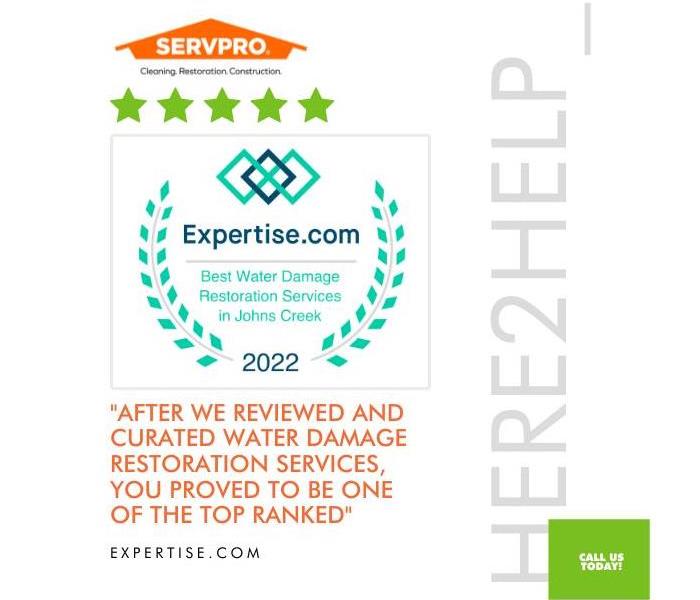 Expertise.com Award for excellent service
Expertise.com Award for excellent service
A water-related disaster in your home or business in Buford, GA is stressful, no matter the size. While you might hope that this would never happen to you, the truth is that it happens more than you think. If your home or business has ever experienced water damage or if you know someone who has, you’re likely well aware of how much damage even minor flooding can cause—and how long it can take to restore things back to normal.
The Award: Water Damage Restoration Services in Buford, GA
Our Water Damage Specialists use advanced water restoration techniques. So if you need help with everything from unclogging a drain, to restoring your home after a second-story toilet overflow, we have the capacity to do it. We specialize in removal and extraction, drying and dehumidification, cleaning and repair, and restoration services, for residential and commercial properties alike.
Our commitment to quality of service and workmanship has earned us an A+ rating from Expertise.com.
Water Removal and Extraction
When water damage occurs, it’s important to start by removing and extracting as much of that water as possible. If not taken care of quickly and properly, water can lead to more extensive – and expensive – problems later on. At SERVPRO of Buford/Suwanee/Hamilton Mill, we offer a variety of services that include water removal and extraction. Our teams can handle everything from small leaks in your basement or garage to large-scale disasters such as floods caused by storms, wind, or hurricanes.
Drying and Dehumidification
For a water damage restoration company, drying and dehumidification are crucial steps in a restoration project. If water is left sitting in a home or business, mold will begin to grow and spread—destroying walls, floors, and furniture in its path. Our SERVPRO of Buford/Suwanee/Hamilton Mill technicians make sure that atmospheric humidity levels are contained to 30-60% relative humidity and salvageable materials are dried and cleaned to preloss conditions before beginning the next steps in our water damage restoration process.
Restoration Services
Here at SERVPRO, we know that you don’t want to repair your home; you want it restored. Our water restoration technicians will work with you and your insurance company (if applicable) throughout every step of restoring your property to its preloss condition. We understand how stressful and frustrating water damage can be – but we also know that our dedication and expertise will help minimize stress and bring closure during a very difficult time in your life.
Call us today at (770) 945-5355 for 24/7/365 service. We are Here to Help.
Secondary Damage: Finding Mold After a Flood
1/12/2022 (Permalink)
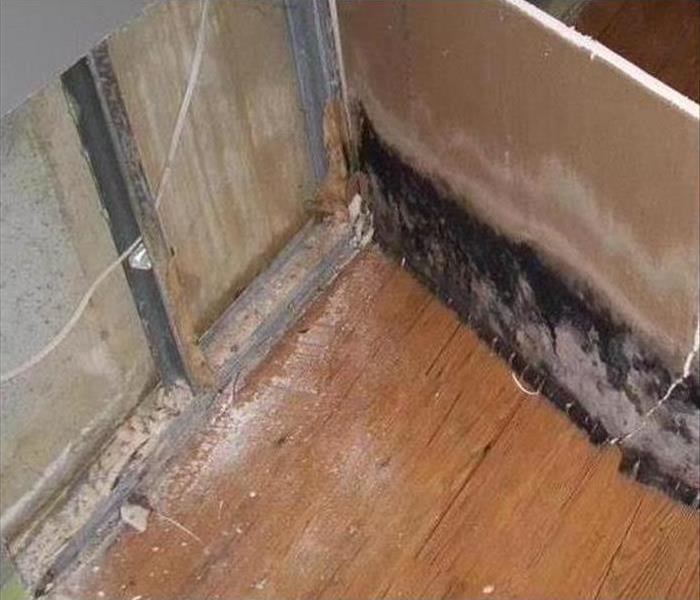 Mold hiding inside a wall.
Mold hiding inside a wall.
Finding Mold After a Flood
If a storm causes water damage to your home, there are many good reasons to get the problem taken care of as soon as possible. Avoiding mold growth is one of the main benefits of quick mitigation. When many homes in Buford, GA, are affected by the same storm, however, water restoration specialists may not get to your repairs before mold starts to grow. It can take as little as 24 hours for a mold problem to begin. When that happens, the technicians may need to add mold remediation to their task list to fix the secondary damage. Here are the steps they take to do that.
1. Remove Water
Water is a major contributing factor to developing mold issues, so it makes sense that in order to combat mold, all standing water must be removed. After that happens, surfaces must be dried.
2. Isolate Affected Area
Because mold spores are airborne, the area containing the mold growth needs to be shut off from the rest of the house. This prevents it from spreading to other areas.
3. Remove Damaged Materials
Everything that the mold touches must be removed from the area. This not only includes items in the space but the parts of the structure, such as walls or flooring, that show signs of mold as well.
4. Clean the Area
Mold tends to latch on to dirt and bacteria. Disinfecting the area makes it less hospitable to any spores that are looking for a place to land.
5. Test the Area
After all visible traces of mold are removed, the problem is likely resolved. To be sure, however, experts can test the area for concentrated patches of mold to ensure that they didn't miss anything.
The best way to treat mold growth, of course, is to prevent it. If you don't get to it in time, however, experts can perform these mold remediation steps to get rid of the problem.
We’re Ready Around the Clock | SERVPRO® of Buford/Suwanee/Hamilton Mill
12/29/2021 (Permalink)
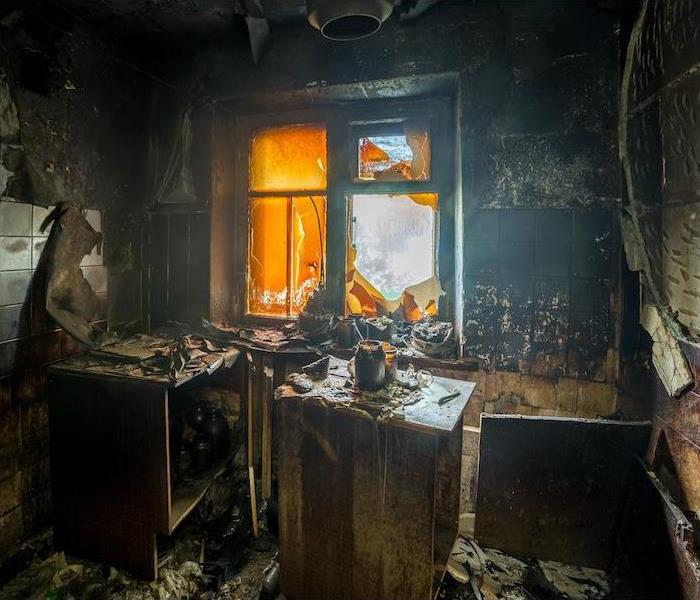 Photo of a Fire Damaged Kitchen
Photo of a Fire Damaged Kitchen
If you remember rotary phones in homes and “blue light specials” at the local big-box store, then it’s likely you’re old enough to remember a time when we did much more of something we hardly ever have to do now: waiting.
Remember sitting in a doctor’s office with nothing to do but twiddle your thumbs or check out a three-year-old magazine? Now you can video chat with your physician from home while you play video games in the background.
So much of our lives is instant now, and that’s a good thing—especially when it comes to the urgency of home damage. If something happens in the night or on a weekend to create an acute need for service, you shouldn’t have to wait. And with SERVPRO’s world-class, 24-hour emergency services, you won’t have to.
Fast service and quick action matter, and here’s why.
After a fire. Fire does much damage in the immediate, that’s plain to see. But soot, the sneaky discharge created when combustion goes uncompleted, works behind the scenes to create even more damage, and it starts only minutes after the fire.
Soot and smoke combine to create stains and smells for which there is a very limited window for repair. Once that window passes, the only recourse is to completely reconstruct affected walls to get rid of them. It’s doable, of course, but having SERVPRO on the scene right away will save you time, money and smelly clothes.
After water damage. It’s hard to miss the puddled water and dripping after a burst pipe, but it’s easy to overlook the fact that 48 hours after water comes in contact with your surfaces, mold starts growing. Mold growth presents a threat to both your health and, eventually, even the structure of your home. The faster your home can be dried and dehumidified, the better off you’ll be.
If storms or natural disasters happen in the night or on the weekend, you’ve got a sudden, acute need, and you shouldn’t have to wait until 9 a.m. the next business day to get help. When time is of the essence, we’re ready to act.
You shouldn’t have to wait for help, and when you link up with us, you won’t. Trust the team that’s Faster to Any Size Disaster. Trust SERVPRO.
When you need help after a home or business disaster, fast service is a priority, and there’s nobody faster or more prepared than SERVPRO. Call us anytime to take advantage of our 24-hour emergency service.
Immediate Response Can Reduce Water Damage Exposure
12/28/2021 (Permalink)
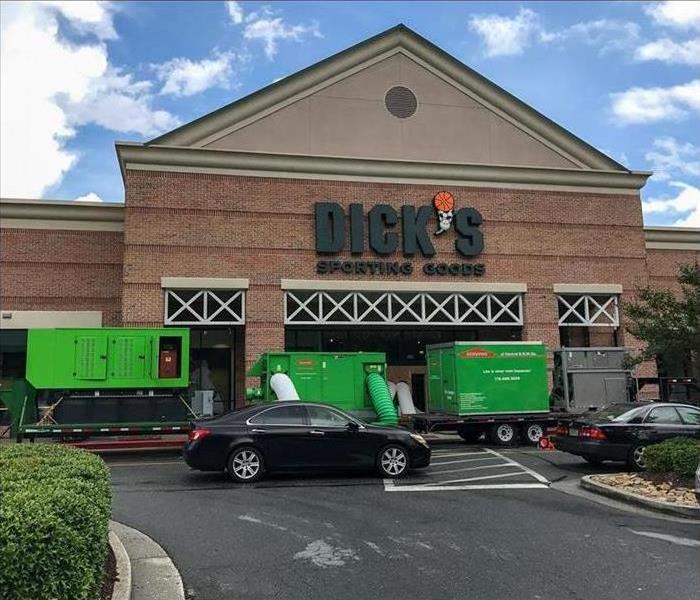 Commercial water damage in Naples Lakes, FL.
Commercial water damage in Naples Lakes, FL.
Cleaning Up After Flood Damage
When you have water damage to your building in Naples Lakes, FL, you need to act fast, but you need your actions to count. Here are important steps to take when you are cleaning up from a flood.
1. Call an expert. Commercial water damage restoration specialists have the expertise and knowledge to get you through the cleanup and recovery process. Since time is so critical, call them before you do anything else.
2. Make sure it’s safe. While you are waiting for help to arrive, you can begin cleanup. Before you do, make sure it is safe. Turn off electricity before entering a flood water area, and don’t use lights or appliances that have been in contact with water. If flooding is caused by black water, protect your body from direct contact.
3. Start removing water. Grab mops, sponges and rags to start the water cleanup process while you wait for the professionals to arrive.
4. Protect key documents. Make sure your most important documents are removed from ground level to reduce exposure to water.
5. Protect furniture. Wooden furniture is porous and absorbent and needs to be set up on blocks or foil so that it doesn’t remain in contact with a soggy floor.
6. Remove carpet and rugs. Experts will help you decide if rugs and carpets can be saved, but removing them will increase your chances. If you can put them outside to dry, go ahead and start that.
7. Gather personal belongings. Picking up personal items from the floor will help make sure the room is ready for the experts to use their commercial pumps and water removers to minimize water damage.
Restoration experts will do all these, but you can increase your chances of saving items by taking action while you wait.
Fast Action Makes a Difference
Broken pipes can wreak havoc in your building, but you can help reduce your losses by having a plan in place to contact professional help and to start cleanup immediately.
Fire Risks to a Commercial Office and Tips to Reduce Them
12/23/2021 (Permalink)
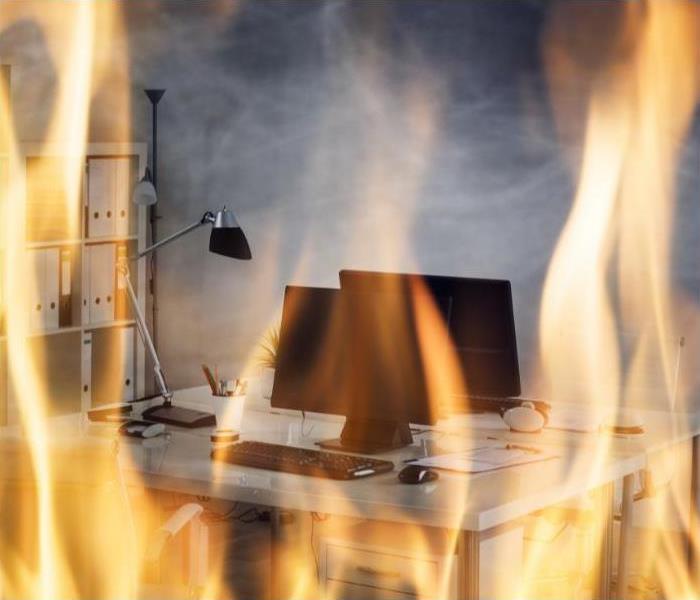 Office Fire
Office Fire
Our homes and our businesses in Hog Mountain or Peachtree Ridge are our castles, which is why we work hard to make them as safe and secure as possible. Unfortunately, there are some hazards that may not be obvious and can cause damage to your office, in the form of fire or water damage. Even more unfortunate? The cost of these damages, which could run into the thousands of dollars, and can come out of your pocket—whether you’re an individual homeowner or a business owner or landlord. Here are some common causes of fire and water damage in commercial office buildings, as well as tips on how to prevent them from occurring and damaging your home or commercial property.
Understanding Building Fire Damage
Most office building fires are small. But even a small fire can do a lot of damage if it gets out of control or isn’t contained early on. One of the biggest dangers is smoke and fire damage to your home or commercial office's interiors. Smoke can permeate materials, carpets, walls, flooring, ceilings—even drywall joints—leaving hidden danger behind long after flames have been extinguished. Even if you can’t see any visible signs of fire or smoke damage, you should always have an experienced professional examine your property for lingering toxins from before you move back in.
According to this report by the NFPA, there are 7 main causes of fires in commercial office buildings. Cooking Equipment, Electrical distribution and lighting equipment, heating equipment, intentional damage, smoking materials, exposure to other fire sources, and electronic, office, or entertainment equipment. This statistic includes general business offices, banks, veterinary or research offices, engineering, mailing firms, and post offices.
Common Causes of Commercial Building Fires
Most office fires are caused by cooking equipment, accounting for slightly over one in every four commercial office fires. However, while these fires are the most common, they do not account for most of the property damage to office buildings. That position is taken by the intentional damage category. Intentional damage alone accounts for a full 20% of commercial fire property damage. Intentional Property Damage occurs when a person seeks to purposely damage the office property through arson.
Two other leading causes of fire in office buildings are heating equipment, electrical distribution, and lighting equipment. Together, they account for 18% of property damage to commercial office buildings. These can include things such as space heaters, light fixtures, electrical wiring, outlets, electrical appliances, extension cords, and more.
While lower on the list, smoking materials, electronic, office, or entertainment equipment account for 12% of commercial office property damage.
Lastly, exposure fires, as defined by the National Fire Incident Reporting System (NFIRS), are fires resulting from another fire outside of the commercial building itself. This kind of commercial fire damage accounted for 18% of property loss.
What Can I Do To Prevent A Building Fire?
If your building was constructed with modern building materials, fire damage should be a rare occurrence. But it can still happen if you’re not careful. Make sure all smoking materials are safely extinguished before leaving work each day. A smoldering cigarette can ignite more easily than you think. Also, make sure to regularly inspect your smoke alarms, carbon monoxide detectors, and fire suppression systems to ensure they’re working properly. If a smoke alarm goes off for no reason at all, make sure to replace or recharge its batteries immediately.
The NFPA uncovered another intriguing statistic about fires on weekends and between the nighttime hours of 7pm and 7am. 19% of fires occurred on weekends but accounted for 31% of fire-related property losses. Meanwhile, fires at night accounted for less than one-third of office property fires, yet caused 67% of direct property damage due to fires.
Automatic Fire Detection & Fire Extinguishing Systems: This shows that one of the most important steps you can take towards protecting your office building from fire damage is to install and maintain automatic detection and fire extinguishing systems.
Camera monitoring systems such as those installed by videosurveillance.com or Pelco would be best for large-scale commercial properties. Otherwise, self-installed solutions such as those recommended in this article by PC Mag will work well.
For fire suppression systems, the best solution is to pay a proper fire protection services consultant such as Fire Protection Services LLC. Make sure to ask them to help you develop and implement a fire suppression system maintenance plan.
Cooking Equipment Fire Prevention: The best way to prevent fires with cooking equipment is to train your staff properly in its use, cleaning, and maintenance. For more on cooking equipment fire prevention, be sure to refer to our article on reducing the risk of commercial kitchen fires here.
Electrical Hazards Fire Prevention: When it comes to electrical distribution and lighting equipment, there is a multitude of reasons why fire may start. But according to this article by firerescue1.com, faulty outlets or appliances, light fixtures, extension cords, space heaters, and wiring issues were the 5 most common electrical fire causes.
To prevent faulty outlet or wiring fire hazards, the first step is to make sure to have a certified electrical contractor or property inspector review your commercial property before purchase. Even if you or a tenant are already occupying your commercial office space, a proper inspection by a certified electrical contractor to ensure code compliance of all building materials and installations will protect you from potentially expensive fire repairs. This is especially important to protect you from having to pay for potential property damages out of pocket.
To protect your commercial property from fire damage due to light fixtures or extension cords, the most important tip is to ensure you follow the manufacturer's maximum recommended wattage and amperage guidance.
A good rule of thumb for selecting an extension cord is the smaller the wire gauge rating, the greater the capacity. According to this article by the Spruce, 12-gauge extension cords can handle up to 1920 watts (16 Amps), 14-gauge cords can handle 1440 watts (12 Amps), 16-gauge can handle 840 Watts (7 Amps), and 18-gauge cords 600 Watts (5 Amps). In addition to wattage capacities, another thing you should look at when choosing a commercial electrical power solution is cord lengths. The longer the cord, the more important it becomes to have a higher wattage extension cord.
For light fixtures, you should follow manufacturer guidelines to prevent property fire damage. However, what you should look out for are potentially dangerous light bulb wattages and materials around your lighting fixtures that could catch fire. High-wattage incandescent bulbs installed on light fixtures that are rated for lower-wattage bulbs can spark flames because of overheating. Also, keeping flammable materials around light fixtures, or allowing dust buildup increases the risk for fire damage.
Call SERVPRO of Buford/Suwanee/Hamilton Mill to Restore Commercial Fire Damage
We hope these tips are useful to help you protect your commercial property from fire damage. In case you experience a property loss in your commercial office building or commercial property, our team at SERVPRO of Buford/Suwanee/Hamilton Mill is available to help 24/7/365. Call us today at 770-945-5355 for rapid assistance.
Drain Cleaner Deterioration and Your Home
12/22/2021 (Permalink)
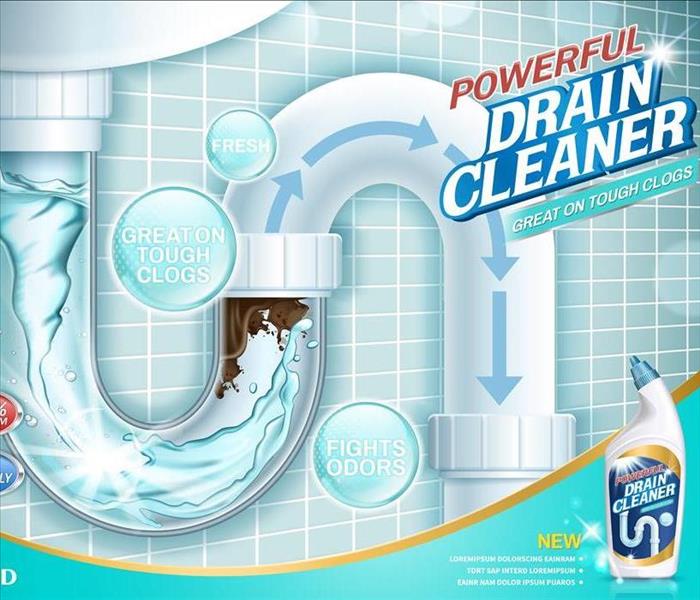 Chemical cleaners can be an effective solution for removing problematic clogs.
Chemical cleaners can be an effective solution for removing problematic clogs.
Deterioration of Drain Cleaners and Your Home
Chemical cleaners can be an effective solution for removing problematic clogs. However, they come with inherent risks and are not always superior to physically removing an obstruction with tools such as plungers or snakes. Consider the following factors when dealing with a clogged drain in Vanderbilt Beach, FL.
1. Health Concerns
Chemical treatments are typically made of lye, bleaches or certain acids. These cause a chemical reaction that changes the molecules of the clog, dissolving them in the drain cleaner substrate and producing heat and gases as a byproduct. Changing the composition of the clog is a potent remedy, but the resulting fumes can health effects. Backsplash or residue from the caustic agents can also eat away at skin.
2. Ecological Issues
Because of the reaction byproducts and leftover active liquid, chemical cleaners can also pose a hazard to waterways and wildlife further down from your residential sewer system. Enzymatic cleaners using natural bacteria may be a better option for the environmentally conscious homeowner facing a clogged drain.
3. Delaying the Inevitable
Because of the aggressiveness of the method, using store-bought chemical agents to remove tough clogs may result in ripple effects in other aspects of your plumbing. Certain acid-base reactions can wear down pipes more quickly than under normal water flow, resulting in cracked pipes. This is especially true of larger grease clogs where the chemical cleaner fails to break through and builds up at the point of constriction, concentrating at a metal juncture.
Furthermore, the breakdown of the mass can be incomplete and simply move it down the line, resulting in the need for an even larger and more expensive clog removal operation later on. These factors, if neglected, can result in the need for sewage cleaning by a qualified restoration service.
A clogged drain can be a major hassle, and the temptation to use the most potent products available is strong. However, judicious use of the full range of options is important to maintain the integrity of your pipes and appliances.
Renters Insurance Provides Comprehensive Fire Coverage
12/6/2021 (Permalink)
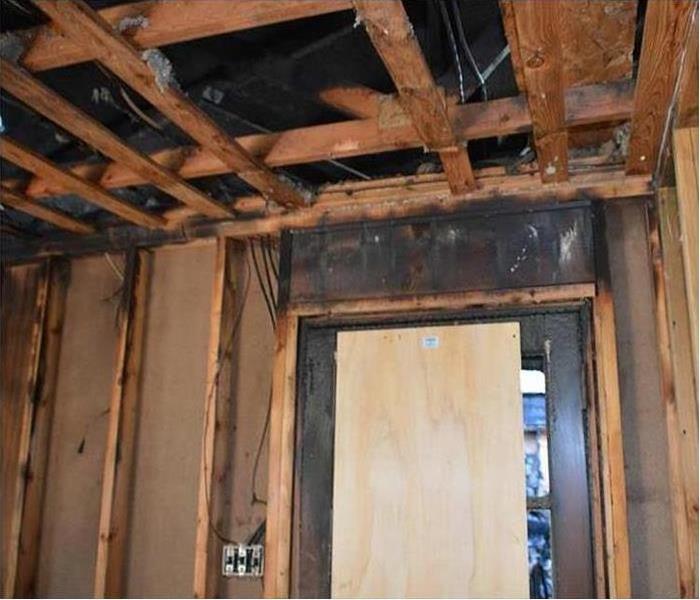 Fire damaged structure in Suwanee, GA.
Fire damaged structure in Suwanee, GA.
Renters Insurance Includes Comprehensive Fire Protection
As a renter, you may feel that you don’t need rental insurance. After all, your home isn’t full of valuables. You reason that:
- It’s not your building.
- Your personal belongings aren’t worth much.
- You don’t need another bill.
All this becomes moot when your new landlord points out that your lease requires that you have a rental insurance policy. After hearing that, you purchase one. When the coverage letter arrives, you put it away with your other important papers, unread. You should have read that letter. It’s fascinating what your rental policy covers.
Renters Insurance Protects You From Liability Claims
Even if your negligence caused the fire, your liability coverage is there to help. For example, it covers other tenants who suffer losses and injuries. Coverage also extends to structural damage.
Insurance Pays Temporary Relocation Expenses
Unless it was only a small fire, you would need to move out until the fire restoration process is complete. Your policy will cover the cost of a hotel in or around Suwanee, GA, and other temporary relocation expenses until your home is ready for occupancy.
Most Submitted Claims Include a List Damaged Personal Property
In a fire, personal property can be damaged or destroyed in several ways including:
- Fire
- Smoke
- Water
- Fire suppression chemicals
- Other damage caused while extinguishing the fire
Your renter's insurance policy covers all costs related to fire damage. Reimbursement of the replacement cost is the norm, not the exception. If a fire destroys your three-month-old television, the insurance company will replace it. You won’t receive a lesser amount and be responsible for the difference.
Put the Fire Behind You as Quickly as Possible
After the fire, you will want to minimize your inconvenience by completing the fire restoration quickly. A team of local fire damage mitigation specialists can help you get out of the hotel and back into your home quickly. Just remember that it’s renters insurance that makes this all possible.
Tips to Prevent Fire in Your Commercial Kitchen
11/30/2021 (Permalink)
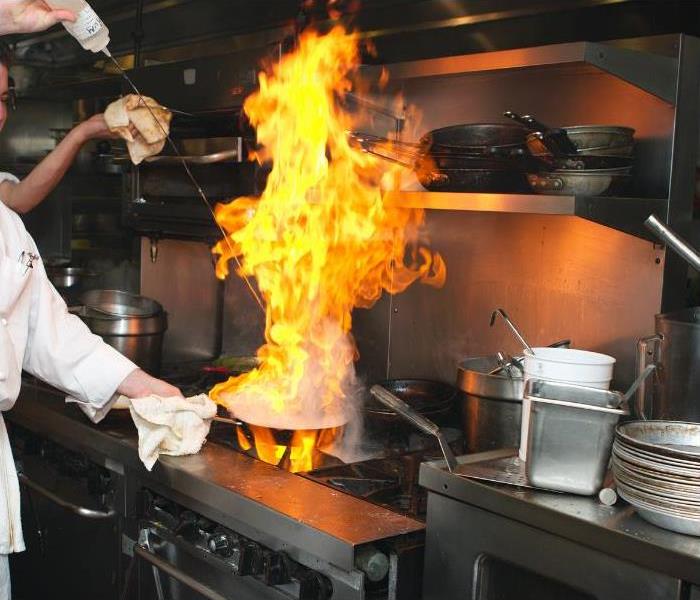 Fire While Cooking in a Commercial Kitchen
Fire While Cooking in a Commercial Kitchen
If you own a restaurant, bar or commercial kitchen in Hamilton Mill or Suwanee, reducing fire risk is critical to continued profitable operation. The National Fire Protection Association (NFPA) reports that fire departments responded to over 7,410 structure fires in the kitchen of restaurants and bars in 2017 alone. The majority of these fires were preventable, resulting in three deaths, 110 injuries, and $165 million in property damage annually in commercial kitchens. These tips will help keep you and your staff safe while preventing shut downs due to fire code violations.
What Are My Ducting and Air Movement Requirements to Prevent Fire?
While Chapter 7 of the NFPA 96 Standard for Ventilation Control and Fire Protection of Commercial Cooking Operations covers this extensively, here are a few key items to keep in mind.
First, commercial kitchen ducts should never pass through firewalls, share an exhaust system with the building ventilation, or have obstructed access panels. While doing these things on a commercial kitchen remodel can save costs in the short term, the fire risk increases significantly. If disregarded, your commercial kitchen work will likely not pass inspection.
Make sure to maintain a minimum clearance of 18 inches between combustible materials and the kitchen ducts. This standard is based on Section 4.2 of the NFPA 96, however is one of the easiest to disregard once the kitchen is operational. Ducts can build up high levels of radiant heat that can ignite combustible materials like boxes, cups, plates, utensils, or other kitchen materials.
If you would like additional information on the types of combustible and non-combustible materials that should and shouldn't be kept near the duct, consult Chapter 3 of the NFPA.
What Are My Commercial Kitchen Fire Extinguisher Requirements?
"The NFPA 96 requires automated fire suppression equipment for all grease removal devices, hood exhaust plenums, and exhaust duct systems in a commercial kitchen, as well as any cooking equipment that produces grease-laden vapors." - Koorsen Fire & Security
The NFPA 96 requires use of class K fire extinguishers in conjunction with automatic fire extinguishing systems. These extinguishers also require installed placards stating their extinguisher class. However, in the case of a commercial kitchen fire, it's critical to activate the automatic fire extinguisher system before using portable-type extinguishers. This is because high-efficiency cooking appliances in many modern commercial kitchens are capable of achieving high temperatures that can raise the vegetable oils to intensely high temperatures. When oil ignites at these high temperatures, it can already be so hot that a portable extinguisher is not enough to stop the flames.
Another standard that you should familiarize yourself with is the UL 300 standard.
According to this article by Insureon, a kitchen’s cooking equipment must meet these UL 300 requirements:
- Fire-extinguishing nozzles in the hood, ducts, and above each cooking appliance
- An automatic fuel shut-off capabilities for both gas and electric power sources
- A manual fuel shut-off pull for all power sources
- A wet-chemical fire-extinguishing system that meets UL 300 criteria (one of which is undergoing semiannual checkups by a certified professional)
If you need immediate assistance after a fire, our teams are available 24/7/365. With our promise of being Faster to Any Size Disaster, you can count on SERVPRO of Buford/Suwanee/Hamilton Mill to be there when it counts. Call us today at (770) 945-5355 for rapid assistance.
4 Steps To Take With a Contaminated Water Problem
11/29/2021 (Permalink)
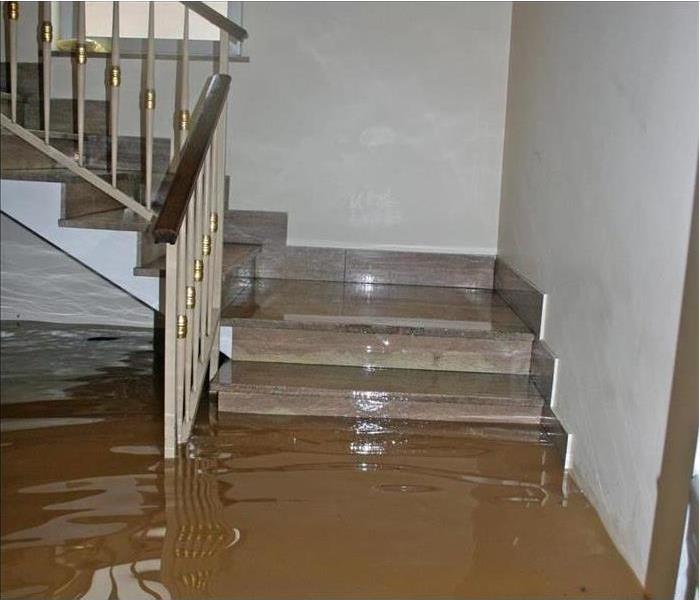 Blackwater in a home is high on the list of a homeowner's biggest worries.
Blackwater in a home is high on the list of a homeowner's biggest worries.
Four Things To Do Right Away
When water leaves its proper place and spills out onto floors and walls, it is always a cause for concern. When that water is filthy, either with raw sewage or other nasty substances, the problem quickly becomes a legitimate emergency. Blackwater in your home in Dacula, GA, should be addressed as soon as possible. Here are four things to do right away.
1. Keep Family and Pets Safe. Make sure everyone is out of the room that contains the dirty water. You never know what substances are in the water and what effects they could have on a person's skin, eyes, or health. Pets might wander in the room and drink the water and spread the tainted water throughout the rest of the home.
2. Call in Professionals. A sewage cleanup requires special knowledge and equipment. Certified technicians from a water mitigation company will use personal protective equipment to work on the problem, and they will use equipment designed to safely remove black water. They will place an emphasis on cleaning or replacing all materials that have been contaminated by the dirty water. In some cases, they will use advanced techniques such as a flood cut to restore areas of drywall and insulation that have received damage.
3. Fix the Problem. Whatever caused the category 3 water (the most unsanitary category of water) to overflow into the home, the situation should be fixed so it doesn't happen again. A licensed plumbing contractor might be needed.
4. Contact Insurance. Depending on the situation, your home insurance policy could cover the cost of cleanup and the replacement of damaged items. Your insurance agent can provide details of your coverage.
Blackwater in a home is high on the list of a homeowner's biggest worries. At first, the problem might seem insurmountable. With the right actions, though, you and your home can be on the way to a quick recovery.
Four Tips for Avoiding Cigarette Fires at Home
11/29/2021 (Permalink)
 Take Your Smoking Outside.
Take Your Smoking Outside.
For many years, the cigarette fire has been a top culprit in home fires. Across the country, this has led to more than $400 million in property damage for homeowners. These may be frightening facts, but there is good news: it's easy to avoid cigarette and ashtray fires.
Pay Attention to Your Cigarette
It's easy to leave a smoldering butt in the ashtray or toss a partially extinguished cigarette into the trash can. When you're finished smoking, make sure the cigarette is completely put out, run it under water, or put it into sand. Cheap ashtrays are sometimes risky, but a top-quality ashtray is likely to prevent an ashtray fire.
Understand E-Cigarette Risks
If you prefer e-cigarettes, it's still important to pay attention to the device. It is possible for fires or explosions to occur. Avoid e-cigarette fires by charging the device with its own charger (not a tablet or phone charger) and don't charge it overnight. If the e-cigarette gets wet, allow plenty of time for it to dry, and then replace the batteries. Protect your kit from high temperatures and keep loose batteries separate from the e-cigarette during storage.
Take Your Smoking Outside
The safest way to avoid a cigarette fire is to step outside while smoking. The main cause of cigarette-related fires in the home is smoking on furniture, generally on the bed or the couch. People often fall asleep with their lit cigarette and then drop it onto sheets, blankets, pillows, or upholstery. Even outside, it's important to have a safe place to smoke. Invest in a good-qualityf outdoor ashtray and keep it away from flammable tools and gardening products.
Don't Smoke After Taking Medication
If you're using any medication that makes you drowsy or absent-minded, don't smoke. If a fire does start, you may not be able to escape from the flames and smoke. Other medical products, such as medical oxygen, are likely to explode if a flame or spark is present.
Rest Haven, GA, experts who tackle fire cleanup may have other tips to help you avoid the most common causes of home fires. Learn more to protect your home and family from a cigarette fire.
What Makes SERVPRO the Best Choice for Your Restoration Needs?
11/17/2021 (Permalink)
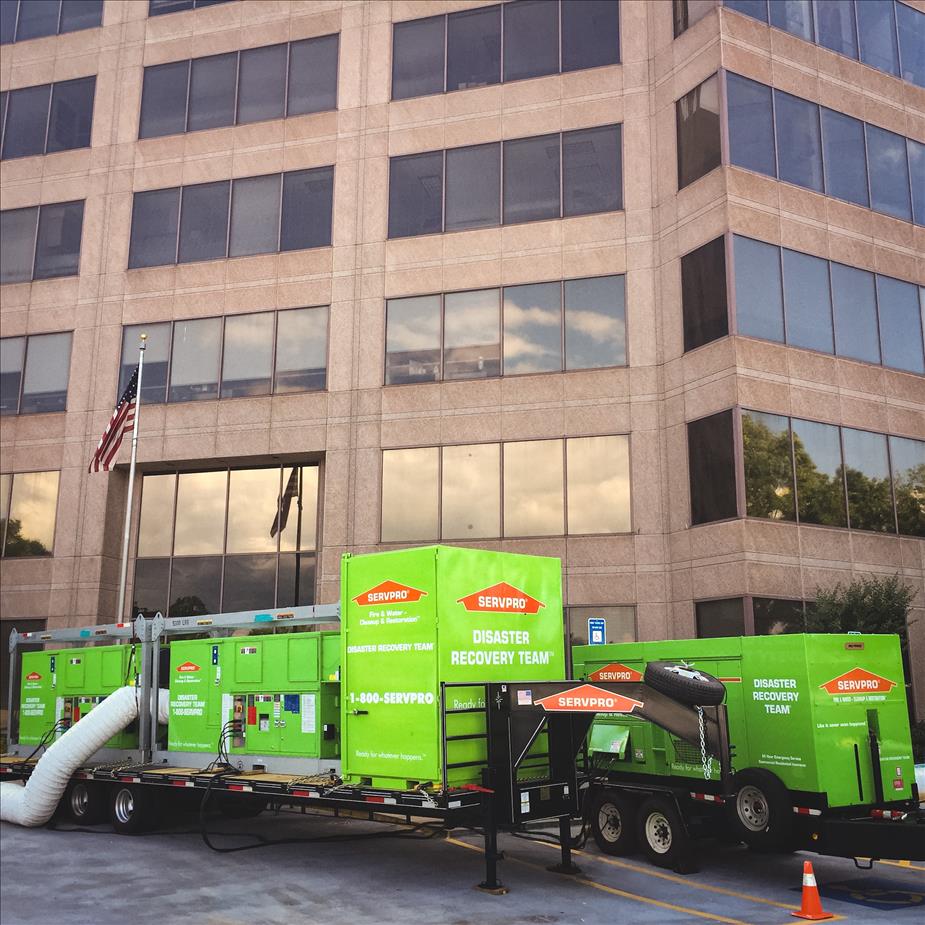 SERVPRO Trailer Mount Restoration Equipment at a Large Loss Restoration Project
SERVPRO Trailer Mount Restoration Equipment at a Large Loss Restoration Project
We know there are many choices out there when it comes to restoring your home, business, or facility after a property damage event. While there are many options, choosing the wrong restoration company can cause headaches and stress through a restoration project that can last for many years even after the project is completed. Whether its water, fire, wind, or mold damage, see why we are the best choice for your peace of mind during and after you experience a property loss.
We Carefully Follow Industry Protocols
The IICRC (Institute of Inspection, Cleaning, and Restoration), is a world-renowned global certification and standard-setting organization for our restoration industry. Since 1972, they have successfully established protocols and procedures that help ensure the utmost quality in any restoration project done by IICRC certified firms and professionals. SERVPRO of Buford/Suwanee/Hamilton Mill ensures each of its field technicians is trained according to IICRC standards, so you can have peace of mind knowing your restoration project will be completed to the highest level of quality and efficiency.
Extensive Network of Subcontractors
Our licensed subcontractors specialize in reconstruction, electrical, plumbing, mechanical, and asbestos abatement. Which enables us to provide full-service restoration services during your mitigation and reconstruction project. All subcontractors are carefully vetted, and skill tested before they ever visit a jobsite. That way, you know your project is in excellent hands from beginning to end.
Proven Project Expertise
Since 1998, we have completed many thousands of commercial and government projects. As a learning organization, we are focused on continual growth and improvement as well. So with our extensive project experience and many 5-star reviews on Google, you can trust that SERVPRO of Buford/Suwanee/Hamilton Mill will bring the knowledge and experience you can trust to your fire, water, wind, or mold restoration project. No project is too large or too small for our team.
Large Inventory of Equipment
From Air Movers to industrial-grade dehumidifiers, air scrubbers to generators, our team has the right equipment for any size job. Combined with the latest monitoring equipment technology available, you can rest assured that your large loss will be in the best hands. Not only is our restoration equipment inventory extensive, but we also maintain strict maintenance schedules for every piece of equipment that enters or exits our over 100,000 SF facility.
Beyond Standard Dedication to Quality
We understand the hardship and stress that can come with a property loss event. That is why we are dedicated to ensuring a smooth restoration process for you in your restoration project with clear and consistent communication from start to finish. That commitment to providing a high-class restoration experience extends to how we maintain our equipment and facility as well. Every piece of equipment that returns from a project is carefully taken apart, cleaned, inspected, and rebuilt to effectively prevent cross-contamination from project to project while ensuring efficient operations so you can get your property back "Like it never even happened."
See for yourself why SERVPRO is the number 1 name in the property restoration industry. Call us today at (770) 945-5355 for 24/7/365 assistance.
5 Candle Safety Tips
11/10/2021 (Permalink)
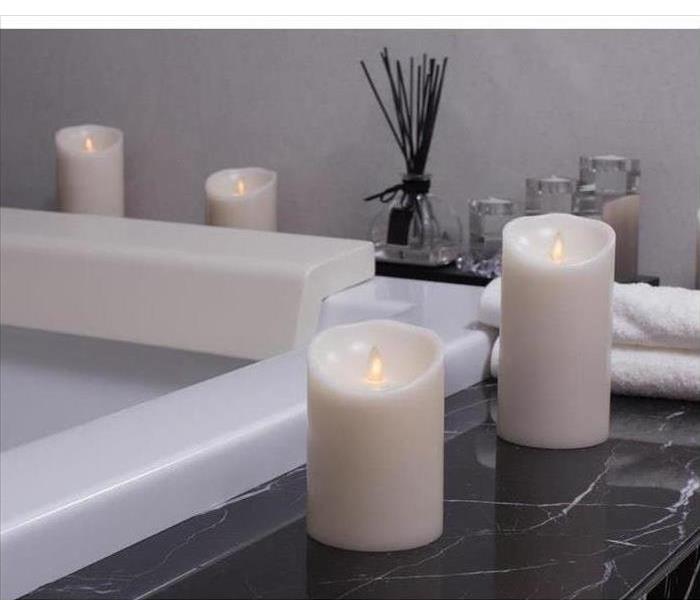 Use alternative candles to protect your home from potential fire.
Use alternative candles to protect your home from potential fire.
Tips For Avoiding a Candle Fire
Many fires in homes are caused by the misuse of candles. Any time you produce an open flame in your home, you must pay special attention to it to avoid accidents. Flammable objects can catch fire in a moment, and then you are calling for smoke cleanup. Here are five tips for avoiding a candle fire.
1. Candle Placement
Candles should only be placed in sturdy holders that are specifically designed for that purpose. Choose stable holders that are hard to tip over.
2. Candle Lighting
Be careful when lighting candles. You should avoid leaning over them as this often puts your clothing or hair dangerously close to the flame. Light candles individually with a lighter or match, not with another candle.
3. Candle Attention
Never leave an open flame unattended. When you leave the room or are ready to retire for the evening, you should make sure all the candles are blown out. Any romance inspired by the soft lighting will likely disappear if it causes a candle fire while you are asleep.
4. Candle Disposal
While it is commendable to want to avoid wasting resources, it is dangerous to burn a candle all the way to its base. This puts the flame too close to the holder and can cause it to become too hot, scorching the surface on which it is sitting or even causing it to catch fire.
5. Candle Alternatives
The easiest way to avoid candle fires is to use other lighting options. Look for flameless candles that can help you achieve the same ambiance without the open flame. Keep battery-powered light sources handy for emergencies such as power outages so that you don't have to rely on candles to see in the dark.
To protect your home in Suwanee, GA, from a candle fire, you must take several precautions. When you use candles safely or choose safer alternatives, you are protecting your home from potential fire damage.
3 Tips for Getting Rid of Flood Odors
11/10/2021 (Permalink)
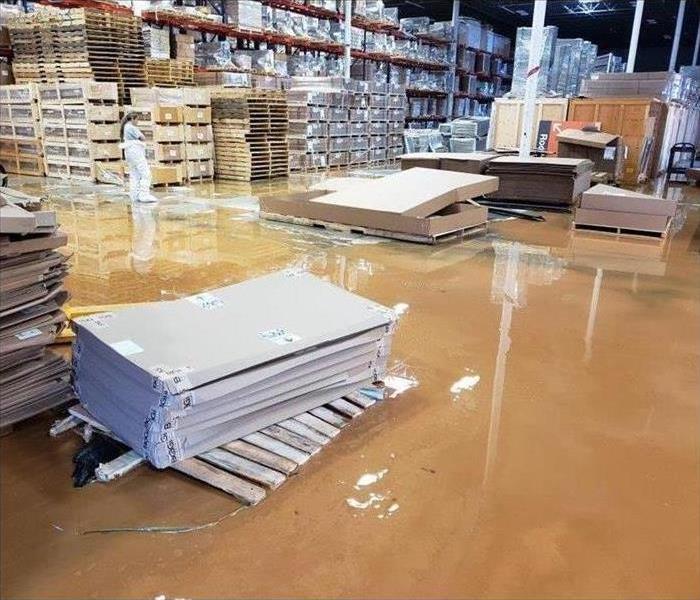 A flooded warehouse in Hamilton Mill, GA.
A flooded warehouse in Hamilton Mill, GA.
How To Get Rid Of Flood Odors In Your Building
It isn't uncommon for musty odors to remain after the flood water has affected your building. Unfortunately, those smells generally signal mold growth and won't just go away with time. The good news is that there are steps you can take to get rid of those smells and protect the structure of your building in the process.
1. Completely Dry the Area
There are several methods of drying out rooms in your building, such as opening windows to provide plenty of ventilation, running dehumidifiers to pull moisture from the air and the carpets, and installing floor fans to increase circulation at carpet level. Don't forget to pay attention to the corners of the room and other out-of-the-way areas. These spots are notorious for remaining moist and harboring colonies of mold.
2. Treat Carpeting and Other Materials With Disinfectants
Some of the chemicals used to treat mold and other odors associated with flooding are necessarily potent. Water restoration professionals have these disinfectants and the training necessary to use them safely, so consider scheduling an appointment with those professionals early on in the process. If only a small area has been affected, you may consider using a vinegar/water mixture to spot-treat. Just be careful not to use too much of the mixture or you'll trigger increased mold growth.
3. Treat Odors Topically
As you work on the underlying causes of odors, you may want to take steps such as using air fresheners or natural deodorizers, such as baking soda sprinkled on affected areas and bowls of vinegar placed around the room. Small bowls of cat litter will also absorb much of the odor in the space. As soon as your vinegar, baking soda, and cat litter have absorbed trouble odors, throw it out and replace it with a fresh bowl.
If you've experienced sewage loss during flooding, be aware of the dangers of coming into contact with raw sewage and the chemicals involved in treating sewage. It's best to contact trained professionals in Hamilton Mill, GA, to resolve mold growth in those situations.
Water Restoration - What Does It Mean?
11/4/2021 (Permalink)
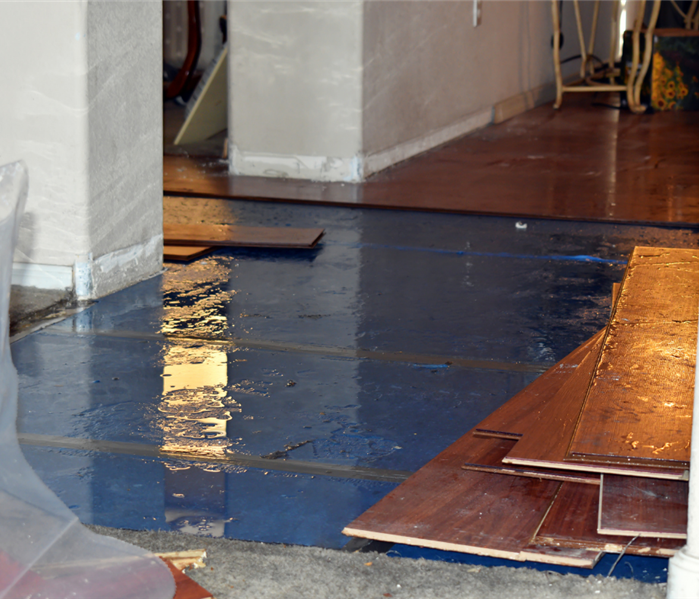 Water Damaged Floor Being Removed
Water Damaged Floor Being Removed
Who would have thought that water could cause so much damage? It’s amazing how quickly things can go from being okay to being completely ruined after just one little mishap with your plumbing, household appliances, or unexpected property damage. If you’ve ever had the misfortune of dealing with water damage, you know how hard it can be to have a company come in and clean up the mess—and you know how long it takes before things are back to normal.
What is Water Restoration?
Water restoration is a professional service that works to restore all areas damaged by water. Water damage happens when a lot of water encounters a surface, object, or other material. Generally, water can cause a substantial amount of damage to property and even lead to mold growth within less than 72 hours if left unchecked. Water restoration companies like SERVPRO of Buford can clean up any damaged floors, ceilings, and other surfaces in your home or office building after flooding or leaks have occurred.
When Do I Need Water Restoration?
Water restoration is a process by which any water damage caused in your house or office is repaired with the help of professional companies. We all know that one wrong step while doing DIY home projects can easily lead to damage to your property. Or maybe a strong storm or other natural events can cause water to enter your home and damage building materials. Even an aging building can more easily suffer from water damage. So, it's a good idea to consider calling SERVPRO of Buford/Suwanee/Hamilton Mill for water restoration services when you notice a leak, notice discoloration on your ceilings, walls, or other building materials, or if you start to smell mold or mildew inside. If you wait too long, you may have to spend more money on repairing it.
How Long Does Water Restoration Take?
If your house or office is suffering from water damage, call a professional restoration service right away. Usually, these companies like SERVPRO of Buford/Suwanee/Hamilton Mill offer same-day service and will begin work immediately after arriving at your home or business. Even so, they can’t just go in and start fixing everything; they need to know what’s been damaged by looking over things carefully and inspecting all surfaces for leaks and potential causes of loss. This step takes time, but it’s necessary for restoring everything to its pre-damage state.
Because so many factors come into play with water restoration, it can be hard to pinpoint an exact timeline until your property is fully restored. However, the building drying process typically takes at least 72 hours depending on the severity of the loss.
If you or your loved ones are experiencing a water emergency, our teams are available 24/7/365 to help you make your home "Like it never even happened."
Call us at 770-945-5355 for immediate assistance.
Fire Sprinkler Maintenance and Testing
10/27/2021 (Permalink)
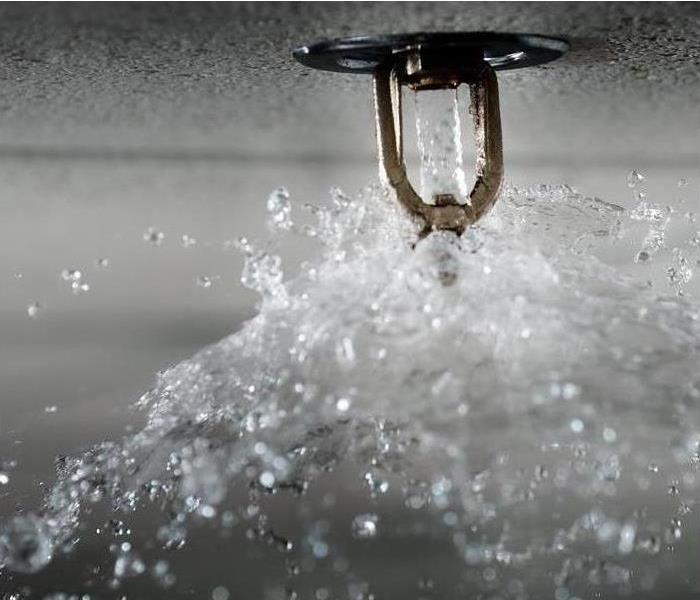 You should test and maintain your fire sprinklers.
You should test and maintain your fire sprinklers.
Don’t wait until a fire has already struck your Buford, GA, property to find out if your sprinklers are working. You should test and maintain your fire sprinklers routinely to ensure that appropriate fire suppression protocols are in place to safeguard your business, your employees, and your inventory.
Fire Sprinkler Maintenance Procedures
Most fire sprinklers have a self-test mode that allows you to simulate what would happen in the event of smoke detection. You should run this test at least once per month (after covering your equipment), but you can also simulate sprinkler function by holding a cigarette lighter near the sprinkler head. To maintain your fire sprinkler, you should:
• Hire a professional for routine inspections. Professionals know building fire codes and standards for sprinklers and can test more accurately than self-testing.
• Conduct your own inspections. Between professional inspections, routinely inspect your fire sprinkler system to see if damage has taken place and all connections are active. Ensure nothing is blocking the sprinklers’ water supply.
• Clean your sprinklers. Fire sprinklers need to be regularly cleaned, particularly the sprinkler heads, so that no blockage prevents them from operating properly.
How to Clean Up After Fire Sprinkler Activation
Once your sprinklers have been activated by smoke or fire, you may have a bit of a sludgy mess on your hands. Wait until a professional has cleared you to enter the building before attempting cleanup. Sprinkler cleanup mostly involves drying and mopping any wet areas, but you may also have to haul out water-damaged equipment and inventory.
Try to avoid leaving standing water, particularly if you have electrical damage after a fire. Standing water can lead to further injuries and mishaps, and it can promote mold growth. Be careful of exposed wires and live power sources around water left behind by your fire sprinkler system.
Water Damage Remediation Process
10/18/2021 (Permalink)
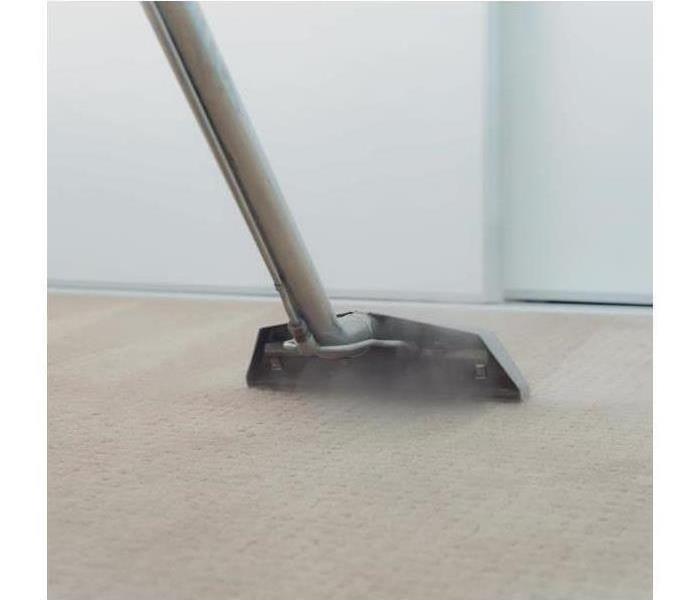 Use specialized vacuums to extract standing water.
Use specialized vacuums to extract standing water.
Water Damage Remediation Process
If your Rest Haven, GA, business experiences flooding, mold growth can follow soon after. It is important to act quickly to minimize further damage. The following steps outline the water-damage remediation process:
1. Document the damage. Before you begin drying out the property, make sure to document the damage. Take a detailed photo and video evidence for your insurance company. As you work on cleaning up, make a list of all damaged items, when you purchased them and how much you paid for them.
2. Remove standing water. Use pumps or specialized vacuums to extract standing water. You can also use buckets to scoop out the water.
3. Dry remaining water. Even after most of the water has been removed, mold growth can still be a problem if furniture, documents or other items are left wet. Fans and dehumidifiers can help with the drying process. If the humidity outside is low, you can open windows and doors to increase airflow.
4. Clean and sanitize affected items. The type of floodwater will determine the best cleaner for your items. If the water came from a clean water indoor pipe, a standard household cleaner should be sufficient. However, if the floodwater contains bacteria, you will need a stronger disinfectant. Anything that cannot be fully dried and sanitized should be thrown away. Professional restorers can help you determine what is and is not salvageable.
5. Repair and replace damaged objects. When everything is clean and dry, you can begin making repairs to your building and bringing in replacement items. Some of these repairs, such as painting, you may be able to do yourself. Delicate objects, such as electronics, will likely require professional restoration.
Flooding can happen to any business, and the damage can be serious. If your commercial building suffers water damage or mold growth, a certified restoration service can help you get your business back to normal quickly and safely.
4 Ways Businesses Can Conserve Water
10/13/2021 (Permalink)
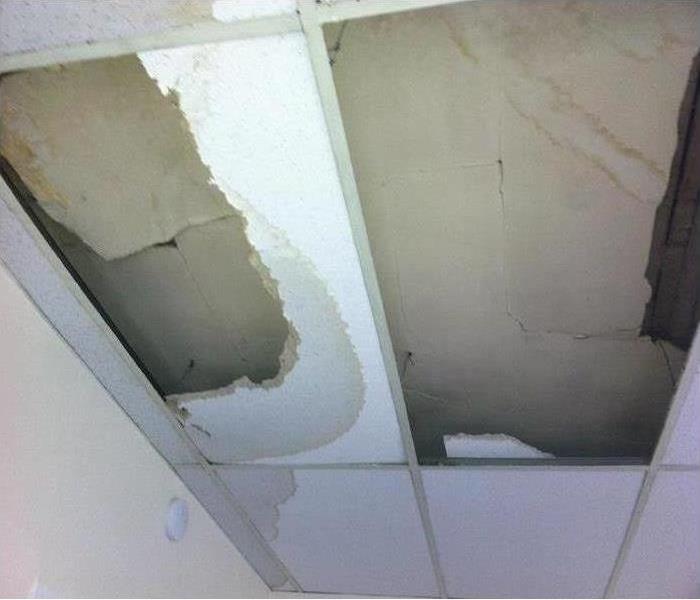 Ceiling damaged by a water leak.
Ceiling damaged by a water leak.
Ways You Can Prevent Potential Water Damage
In day-to-operations, it can be easy to forget that water is actually a scarce resource, which can be especially so when a Hamilton Mill, GA, business faces water issues. With potential rate increases and more people using that resources, businesses can make an impact by lowering consumption. Many of these easy solutions can also prevent potential water damage.
1. Check for Leaks
While sometimes they are obvious, leaks can be quite tricky. Checking the water bill for an increase in usage is one way to confirm there might be a hidden problem. If there has been an increase, consider getting your plumbing professionally inspected.
2. Conduct an Audit
Every business is different, as is how they use water. Local water companies often work with businesses to help them determine more efficient ways to use water, as well as tips to enhance existing systems.
3. Go Low-Flow
For businesses operating out of an older building, it may be time for a water upgrade. Newer sinks and toilets are designed to limit water waste. Low-flush toilets typically only use 1.6 gallons per flush compared to 5 gallons for older models. There are also low-flow faucets and other minimally expensive parts that can help you save on your water bill.
4. Landscape
Along with reducing irrigation needs, rethinking landscaping can also solve numerous water issues. Incorporating swales can direct stormwater runoff to a rain garden or other landscaping, reducing the need for watering the plant. Changing to native plants that require minimal maintenance also minimizes water consumption. Adding stone, pebbles or pervious paving will add a welcome aesthetic while reducing water use and preventing water damage that could result in needing a flooding and mold remediation and restoration professional.
Instead of dealing with water issues, such as high bills and leaks, set aside time to get the internal structural workings of your business optimally running. Even a few small changes can make a big difference.
What To Do After Your Upstairs Bathroom Floods
9/27/2021 (Permalink)
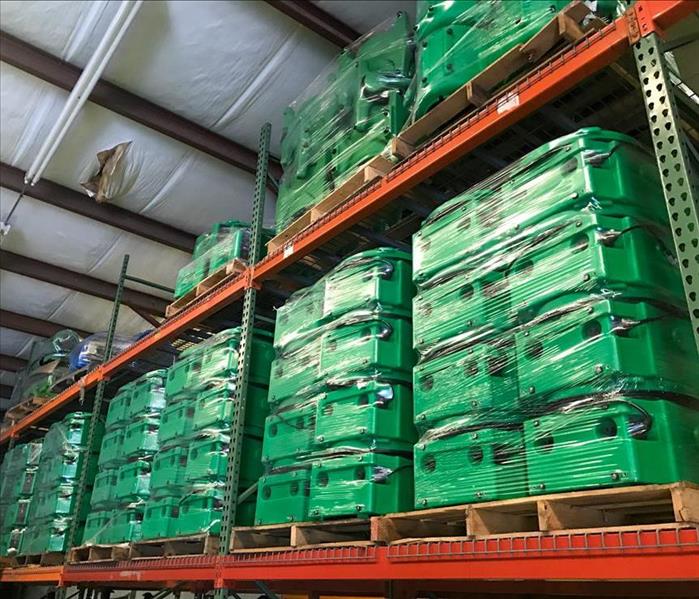 Certified experts can clean your building out and rebuild it when this happens.
Certified experts can clean your building out and rebuild it when this happens.
One of your employees reports water spots forming on the ceiling underneath one of the restrooms on the floor above. What do you do when an upstairs bathroom in your building in Buford, GA, floods the floor below? Of course, you want to call remediation experts, but there are things you can do before they arrive to minimize the sewer damage.
Before Experts Arrive
If a flooded toilet is leaking through the ceiling below it, the leak isn't going to slow down until the water from the toilet stops flowing. You also want to make sure that your employees are safe. There are a few things you can do to halt the damage and protect your people:
• Turn off the water supply to the toilet.
• Turn off electricity to the areas on both floors.
• Remove water or block off the area to contain it.
Turning off the water and the electricity make the area safer. Starting to remove water from the area keeps the sewer damage contamination from spreading.
After Experts Arrive
Once the technicians from the sewage company show up to begin remediation, they take over the situation. They will likely start by extracting the rest of the water. Then they tear out all the ruined materials, such as ceiling tiles, insulation, and flooring that was compromised by the flooded toilet. To avoid mold growth, they will completely dry everything out and disinfect it so that no bacteria becomes embedded in the adjacent flooring or ceiling tiles. After everything is dry and clean, the restoration process starts. A new ceiling and floor can be installed, and the restoration technicians often match them to the existing materials.
When a toilet overflows and floods not only the floor of the bathroom where it is but also the floor below it, there is likely going to be sewer damage that needs to be remediated. Certified experts can clean your building out and rebuild it when this happens.
Flood Aftermath: Avoiding Mold
9/13/2021 (Permalink)
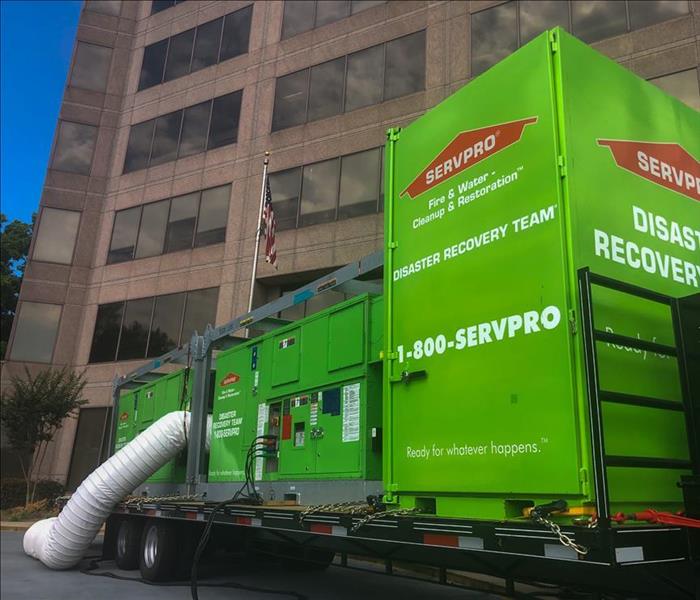 Prevention and timely remediation are the keys to avoiding mold growth.
Prevention and timely remediation are the keys to avoiding mold growth.
During storm season, your home in Buford, GA, is especially vulnerable to flooding. In addition to all the practical remediation steps for water damage, another problem to look out for is mold growth. It doesn't take long for mold patches to form when you have standing water. Knowing when to prepare for the possibility of fungus growth and the actions to take may help you avoid the problem.
Flooding Risk
Storms that produce a lot of rain also bring a higher risk of flooding. When there's more water than an area can hold or disburse, you may see some flooding in your home. Some areas are at higher risk than others:
• Areas near rivers and streams, especially if the terrain is hilly
• Densely populated areas, particularly those with poor drainage systems
• Locations that experience huge snowdrifts that eventually melt and runoff
• Places that experience sudden, intense rainfall
• Coastal areas at risk during hurricane season
If you live in any of these areas, your home is more likely to flood. If the flood is due to a natural disaster that affects a lot of people, you may have to take some measures into your own hands to avoid mold growth.
Mold Risk
Mold can attach and start to grow as soon as 24 hours after water damage has occurred. This process is accelerated if the water contains bacteria, as floodwater tends to do, since mold feeds on organic matter. Contaminated water is like a smorgasbord for mold, providing all the things it likes in one substance. All it needs is a surface to land on, and the fungus can begin to flourish. To discourage growth, guard your home against flooding. Keep drainage systems clear, and make sure your foundation is in good shape. If your home does flood, call water remediation specialists to alleviate the problem as soon as possible.
Prevention and timely remediation are the keys to avoiding mold growth. Your vigilance in this matter can keep your home from having mold damage on top of water damage.
The Steps of the Clean Water Mitigation Process
9/2/2021 (Permalink)
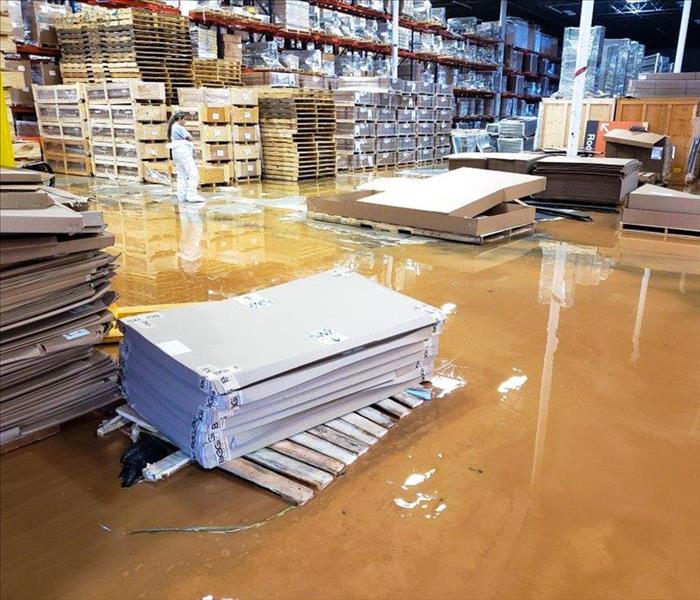 Even if your damage is a case of pipe burst cleanup, it's best to take care of it as soon as possible.
Even if your damage is a case of pipe burst cleanup, it's best to take care of it as soon as possible.
Finding out that you need water cleanup in your commercial building in Buford, GA, is never fun. If you must require the services of water mitigation specialists, however, clean water remediation is usually the least problematic. Here are the steps you can expect the technicians to follow during pipe burst cleanup.
1. Initial Consultation
As soon as you call, the representative on the other end of the line may ask questions designed to get to the root of the problem. This helps the company plan which equipment to bring to your building and can make the process flow more smoothly.
2. On-Site Assessment
The real plan is formed when technicians arrive at your property. They inspect the building and determine a course of action. They may also provide emergency services, such as shutting the water or power off to the area if you have not already done so.
3. Water Extraction
Using industrial pumps, the professionals remove water from the area. The sooner the pipe burst cleanup begins, the less likely you are to experience secondary damage, so it's imperative that as much water is removed as quickly as possible.
4. Surface Drying
To prevent mold, everything must be dried. Dehumidifiers tame the moisture in the air; fans and wet vacuums pull water out of fabrics and off surfaces.
5. Restoration Process
Even if the water damage is a result of a supply line breaking, that doesn't automatically mean the damage wasn't extensive. Walls and insulation, as well as ceiling tiles and flooring, may still have to be removed and discarded. The restoration experts then replace them and try to make sure wallpaper, paint or tiles match up before the job is done.
Even if your damage is a case of pipe burst cleanup, it's best to take care of it as soon as possible. By mitigating clean water damage quickly, you can avoid secondary damage and get back in your building.
3 Mold Prevention Facts That Nobody Told You
7/24/2021 (Permalink)
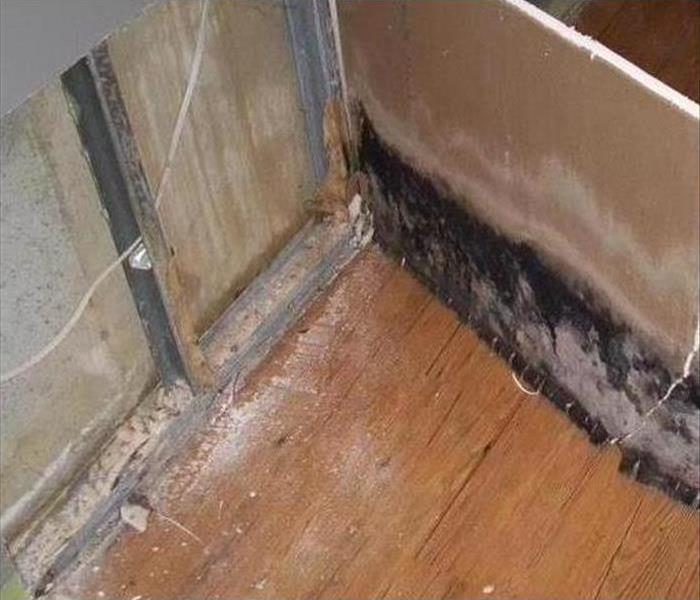 Mold damage in Suwanee, GA.
Mold damage in Suwanee, GA.
Mold Prevention Facts
Tired of trying the same mold prevention methods as everyone else in Suwanee, GA? Here’s why they aren’t working and why you shouldn’t wait too long to deal with water damage.
1. Ventilation Systems Only Work Before Mold Forms
After mold has formed and dried up, its cellular legs become exposed, allowing them to fly through the air like a dandelion seed. Mold can be “planted” once again or remain dormant until it finds a suitable area to grow. Turning on a ventilation system may pull dried mold throughout your building, allowing it to spread. Always stop your ventilation system if you’ve had a mold outbreak.
2. Mold Can Still Spread With Mold-Resistant Materials
When a product like drywall or sheetrock claims to be mold-resistant, it may give you the impression that it completely prevents mold growth. This is simply not true, especially if you’ve already had a mold outbreak and the spores were allowed to spread throughout the building. If the building materials are exposed to moisture for prolonged periods of time, mold can survive on them temporarily until it dries up or finds a better area to settle in the building.
3. The Basement Isn’t Your Only Priority
After water damage, most folks focus their mold prevention efforts only on the inside of a basement, draining it and placing humidifiers throughout. However, before a basement becomes flooded, the water has to come in from the ground around it. If your building isn’t naturally elevated, excess rain water may try to escape directly to the basement.
You may need a professional restoration service to rework the walls in your basement and lay tile lines under the ground around your building. They can guide rainwater away from the basement to help prevent it from entering the building and creating mold.
If you have water damage in Suwanee, GA, don’t wait to deal with it until mold settles in. The key to preventing mold growth is to act quickly and mitigate further damage by restoring the area of your property that has been affected.
Natural Gas Safety and Fire Prevention Tips
7/23/2021 (Permalink)
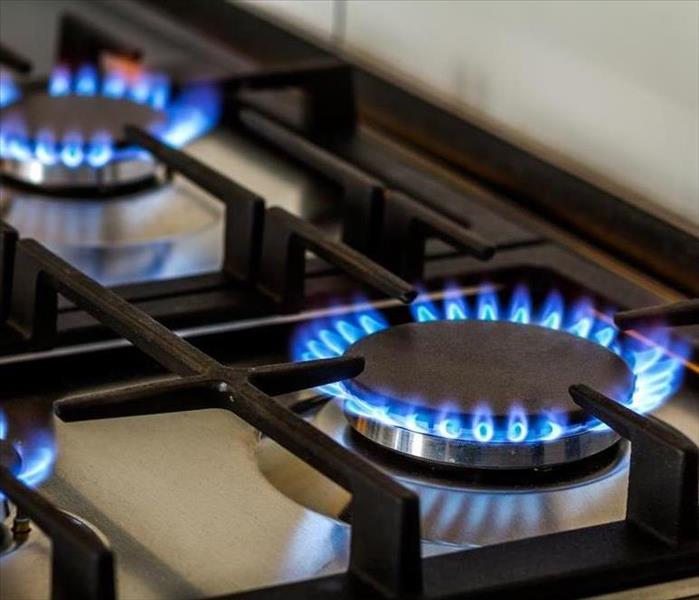 To keep homeowners safe from a gas explosion, fire recovery and restoration experts recommend proactive maintenance on every gas appliances.
To keep homeowners safe from a gas explosion, fire recovery and restoration experts recommend proactive maintenance on every gas appliances.
Safety and Fire Prevention Using Natural Gas
Natural gas is a simple carbon-hydrogen, air-like compound that has no unpleasant odor. In order to keep people safe, a rotten egg smell is added by the businesses that distribute the gas to home suppliers. The sulfuric odor is meant to alert homeowners to a dangerous situation because as the smell becomes noticeable, the presence of the highly combustible gas can pose a great threat to homes, animals, and human life. A natural type gas fire is one of the most explosive situations a property owner can experience, and one of the most devastating as well.
Safety Tips
Because of the explosive nature of natural gas, there are some expert-backed safety tips regarding steps to take the moment you notice the unpleasant odor of rotten egg-infused gas. So, if you notice the tell-tale smell, take care to do the following:
Extinguish all open flames including cigarettes and candles.
Turn off any flames powering appliances such as water heaters or gas stoves.
Refrain from flipping any electrical switches on or off.
Leave the area and contact authorities as soon as possible – but not from a phone inside your home.
Furthermore, it is important to take all pets out of the house to prevent potential harm or injury.
Prevention Tips
Natural gas is a huge part of many people’s lives in Rest Haven, GA. From ovens to barbeques, there are many ways people heat and cook with the explosive gas in daily life. To keep homeowners safe from a gas explosion, fire recovery and restoration experts recommend proactive maintenance on every gas appliances at least once a year. The same maintenance should also be done on gas lines into the house and all appliance supply gas joints. Installing a carbon monoxide detector and refusing to sleep in a room heated by gas can also prevent serious injury from a gas fire.
Security Tips
If you do happen to smell a leak, don’t attempt to locate the source of the natural gas. It is always important to remember that the smallest spark can ignite a gas fire.
How To Handle Burst Pipes and Flooding
6/24/2021 (Permalink)
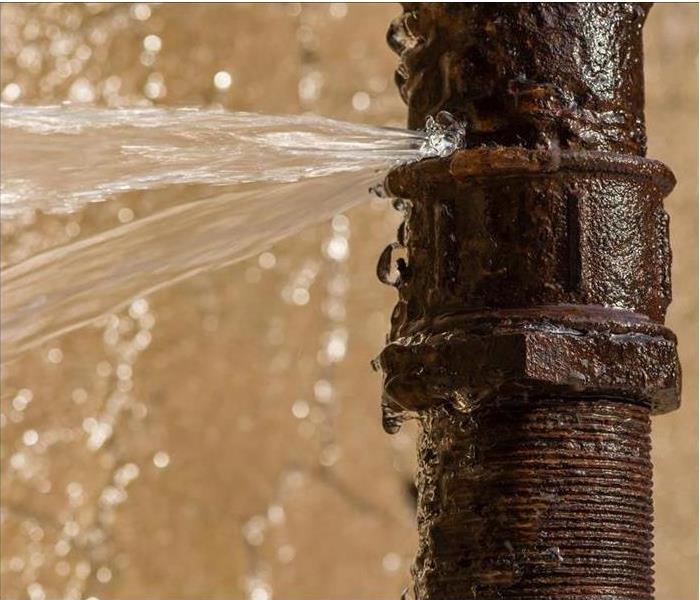 Bursting pipes can cause flooding in your property.
Bursting pipes can cause flooding in your property.
When bursting pipes cause flooding in the basement, your first step is to stop the water coming into the home; do this by shutting off the water main. The next step is to contact a professional for immediate remediation. At this point, you can begin removing water from your Hamilton Mill, GA, home. A word of caution: if there's any risk of electricity and water mixing, turn off the electricity before getting near the water.
Signs of Leaking Pipes
If you're lucky, you can catch the warning signs of hidden leaks before you have to deal with bursting pipes. If you recognize any of the following signs, act immediately to fix broken pipe hardware.
- Bulging walls, sagging ceilings, spongy flooring
- Stains on surfaces of the home
- Musty smell
- Unexplained increase in your water bill
- The appearance of mold or mildew on the walls
- A notice from your water meter
You may have lots of questions. Here are some of the answers you need.
1. How many days will the cleanup take?
The most accurate answer to this question is that it depends on what type of water flooded the basement, how long the water was there, and what type of materials were involved. However, most of the time, water damage takes about three to five days to clean up. If you had wood floors or other special circumstances, the damages may take about a week and a half.
2. What are the long-term results of water damage on my home?
Long after you fix broken pipe connections and other sources of flooding, you may find effects of direct water contact. Some of those results include sagging drywall, swelling wood, peeling paint, and damaged electronics. Anywhere water came in contact with the home, there is the potential for mold growth, as well.
3. Can't I handle bursting pipes on my own?
It is best to work with a remediation professional who understands the risks and the long-term consequences. If you want to avoid further damages and mold growth, discuss the situation with an expert.
4 Ways You Can Avoid Fire Hazards While Cooking
6/24/2021 (Permalink)
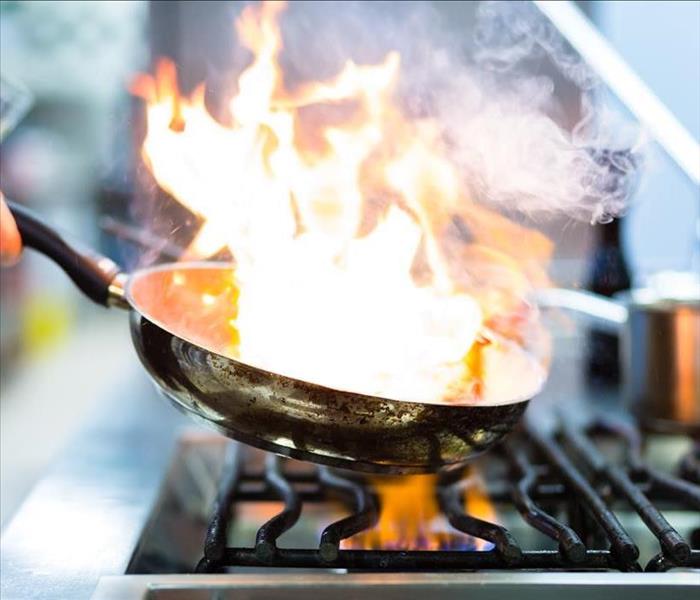 Kitchen fires can be scary and dangerous.
Kitchen fires can be scary and dangerous.
Ways To Prevent A Grease Fire
Cooking is a normal part of daily life. However, fires in the kitchen can happen when you’re not paying attention. Fire damage can cost a lot of time and money, so it’s best to avoid causing problems in the first place. Here are a few tips that can prevent an oven or grease fire from starting.
1. Keep Your Cooking Space Clear
One of the easiest ways to prevent disastrous consequences is to keep your counters and oven tidy. Flammable objects such as paper, plastic bags, wooden utensils, or towels can often clutter the kitchen and sometimes get in the way while cooking. Before you turn any heat on, be sure to clean up your cooking space.
2. Stay in the Kitchen
One of the most important fire safety tips is to stay nearby while your food is cooking. Not only will you be able to contain fires that start, but you can prevent them from ever happening by keeping an eye on the temperature of the stove and preventing food items from burning.
3. Install an Alarm
Smoke detectors can warn you and household members of a fire, which is why it’s important to have an alarm installed in or near your kitchen area. It is wise to install a few more alarms in locations such as:
- Bedrooms
- Living room
- Stairways
- Basement
Having smoke alarms in many locations, including the kitchen, within your house can protect you and your family from harm.
4. Clean the Stove
Appliances such as the oven and stove need to be cleaned regularly to decrease the risk of a fire hazard. A grease fire can occur when grease builds up over time and ignites. Grease fires can become dangerous quickly, and they should be avoided as much as possible.
Kitchen fires are scary and dangerous, so it’s important to take extra measures to prevent them. By incorporating these tips in Rest Haven, GA, you can reduce hazards and fire damage.
5 Steps To Prepare a Commercial Property for Flood Damage
6/24/2021 (Permalink)
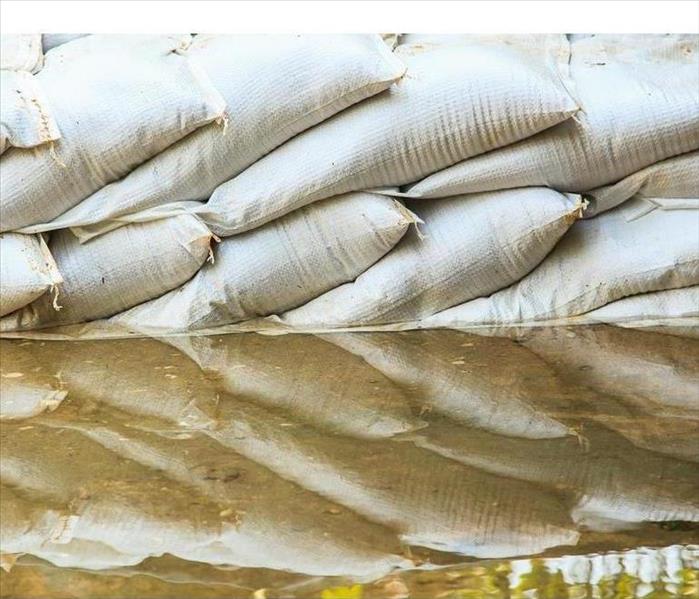 Sandbagging can prevent floodwaters from entering your property.
Sandbagging can prevent floodwaters from entering your property.
Limit The Extent Of Flood And Storm Damage
If your commercial property in Buford, GA is located in a flood zone, you should take measures to prepare your property for flooding risk. These five steps are effective ways for property owners to limit the extent of flood damage and storm damage.
1. Elevate any critical utilities. Raise any electrical panels, switches, or wiring to a higher level. You may want to elevate appliances and heating systems. It is also a good idea to switch off the flow of electricity to any non-necessary appliances.
2. Build sandbag walls to reinforce doors and windows and hold back floodwaters. Sandbagging is a tried-and-true technique for preventing floodwaters from entering your property. Use polyethylene sheeting to build the most effective barriers.
3. Move furniture, important records, and valuables to a dry place. Business owners should come up with a plan that will protect as many building contents as possible. This may limit the extent of clean-up and restoration efforts after flooding.
4. Waterproof the basement and make sure the sump pump is working. If your commercial property has a basement, you should take steps to waterproof the underground portion of the structure well in advance of a flood event. You may also want to install a battery-operated pump or generator to ensure that the sump pump will continue to operate even if the power goes out.
5. Develop a flood evacuation plan. In addition to planning for the safety of your property and contents, you should also develop a flood evacuation plan for occupants. Anyone who ends up stranded in flash flood conditions should avoid flooded areas and moving water.
Following these five steps can help you prepare a commercial property for flooding. If floodwaters enter the structure or damage the contents of the building, contact a restoration company near Buford, GA that specializes in storm damage and flood damage.
Does My Business Need Flood Insurance?
6/14/2021 (Permalink)
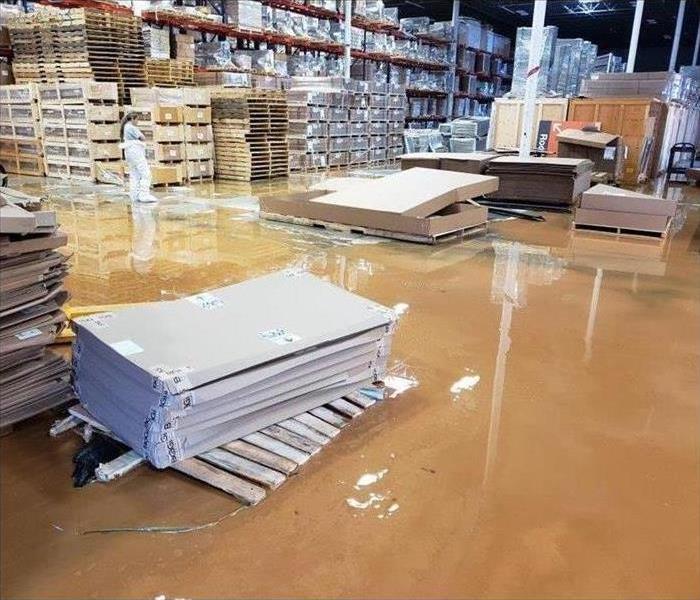 Flood damage in Dacula, GA.
Flood damage in Dacula, GA.
Flood Insurance for Business
Being a business owner means always thinking about your bottom line and always trying to cut costs where you can. You likely know that it’s a good idea to review your commercial insurance coverage periodically to be sure that, on one hand, you have enough coverage, and, on the other hand, you aren’t overpaying for coverage you don’t need. Flood insurance is a topic that often comes up during this type of coverage review: Do you need a flood policy? Asking yourself these three questions could help you determine whether you should have flood insurance in place for your Dacula, GA, business.
1. Is My Business Located Within a Flood Zone?
The U.S. Federal Emergency Management Agency has developed a series of maps that designate certain areas as flood zones. You can check your location’s flood zone designation here. If your building is located within a FEMA flood zone, your mortgage company requires you to maintain a flood policy in addition to other commercial insurance. If you don’t have a mortgage on the property, you may still want to carry flood insurance.
2. How Would a Flood Affect the Contents of My Business?
Take a moment to think about what sorts of items, inventory, and equipment are physically located in your business building and consider what would happen if the building were to be filled with an inch, or a foot, of floodwater. Are most of the business contents replaceable, or would a flood cause irreparable damage to original documents or one-of-a-kind equipment?
3. Do I Have Funds Available to Cover Flood Expenses Without Insurance?
Flood cleanup can be a long and expensive process. Water can damage flooring, drywall, furniture, electronics, and even your building’s framework. Without flood insurance, you would need to pay for cosmetic and structural repairs and other expenses such as water damage mitigation and mold control.
If your business is in a flood zone or stands to suffer significant damage in a flood, adding a flood policy to your commercial insurance portfolio is a smart decision that could keep you from paying thousands out of pocket.
The Advantages of Professional Mold Testing
6/14/2021 (Permalink)
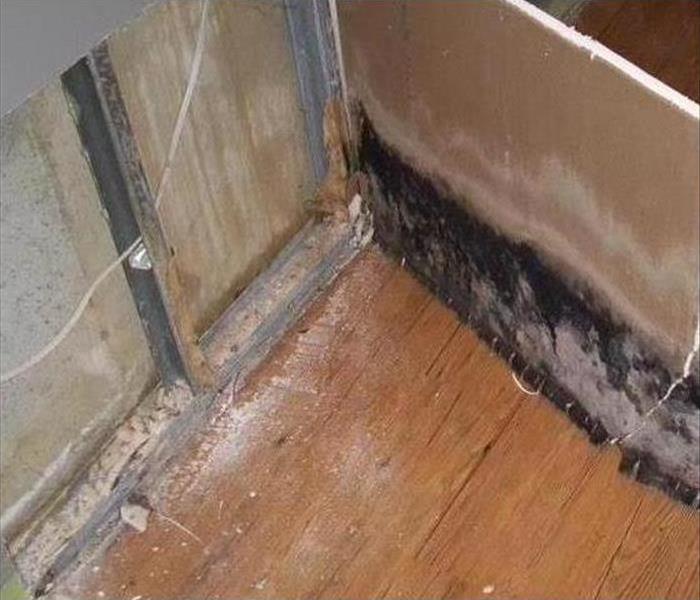 Black mold damage behind a wall
Black mold damage behind a wall
A patch of mold on the wall or a musty odor in your home is a sign that you need mold remediation. When this happens, many homeowners in Suwanee, GA will purchase mold testing kits from the local hardware store. Unfortunately, these kits don't reveal the information mold remediation specialists need to address the problem. Only a test from a certified environmental hygienist yields accurate results.
Type of Test
DIY mold tests simply indicate that there is mold in your home, but that doesn't really give you any new information. There are always mold spores in the air because they travel in from outside on clothing, hair, shoes and pets. However, a professional hygienist can get a useful reading with several types of surface tests:
- Bulk samples
- Swab samples
- Tape samples
During mold testing, the hygienist may also take air quality samples using spore traps. No matter how the data is gathered, however, it is then sent to a lab for investigation to better inform the mitigation process.
Mitigation Process
While a mold kit only reveals the presence of spores, a professional test is more conclusive. Once the type, location and concentration level of the mold problem is discovered, technicians can seal off the affected area and start mitigation. They remove all material that has too much mold damage to be salvaged. Then they clean and dry the area to prevent mold from returning. When the process is complete, it's a good idea to have the environmental hygienist conduct post-testing to verify that the mold problem has been resolved.
When you suspect that you have a mold problem in your home, it is natural to want to save money conducting your own test. Unfortunately, the DIY kits are typically a waste of money because they don't tell you what you need to know. Professional mold testing necessary to get an accurate reading of the whole scope of the issue.
What Are Your First Steps After a Commercial Fire?
4/19/2021 (Permalink)
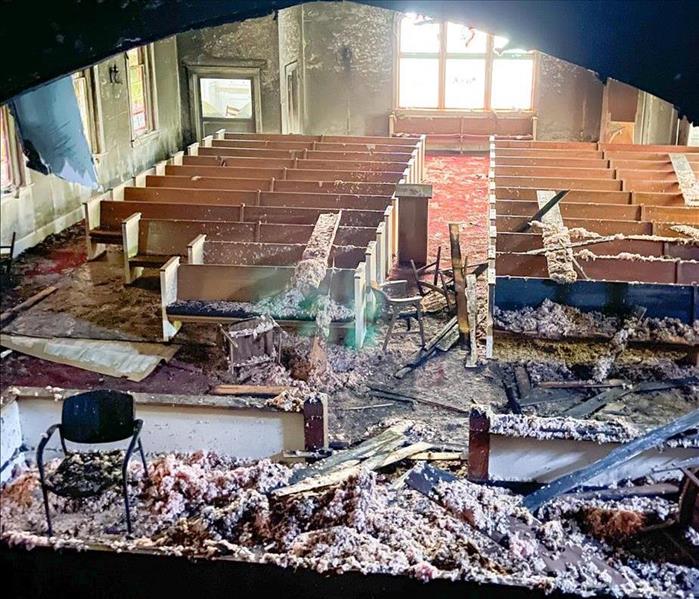 Fire damage in a Sugar Hill, GA building.
Fire damage in a Sugar Hill, GA building.
Fire Restoration Process
If your commercial building in Sugar Hill, GA, has been affected by a fire, the fire restoration process can be overwhelming and confusing. However, if you know the first steps to take after a fire, it can be easier to deal with. After you have called in any professional services you need and made sure that any emergencies are dealt with, you can use these tips on what to do when beginning the fire restoration process.
First Aid
After a fire has impacted your commercial building, the first thing you should always do is check to see if anyone is hurt or needs medical attention. Make sure all building occupants are accounted for and are unharmed. If necessary, get medical attention from emergency services to help treat any injuries.
In the event of a minor burn, you can begin treating it immediately by following these steps:
- Remove any jewelry or clothing
- Cool and moisturize the skin
- Loosely bandage the affected area
- Alleviate lingering pain with over the counter medication
Call Insurance
After calling in a fire and smoke restoration service, you should begin the process of filing a fire claim. Call your insurance company to begin a claim and document damages from the fire as soon as possible. When filing a fire insurance claim, be sure to thoroughly read your coverage and understand how the process will work and keep track of everything needed, including documentation and paperwork. If you're unsure, you can also get a second opinion on the extent of your damage.
Don't Touch the Damage
If your building has been damaged, it's important to stay away and leave it untouched. Trying to fix the damage without professional help can lead to more problems with your commercial building. Instead, call in a professional restoration company to help you with smoke cleaning and other restoration services. However, it's important to document all of the damage for insurance purposes before beginning repairs.
Use these tips to make the fire restoration process as painless as possible and help you get your building up and running again.
How To Clean Your Grill and Why You Need To
3/30/2021 (Permalink)
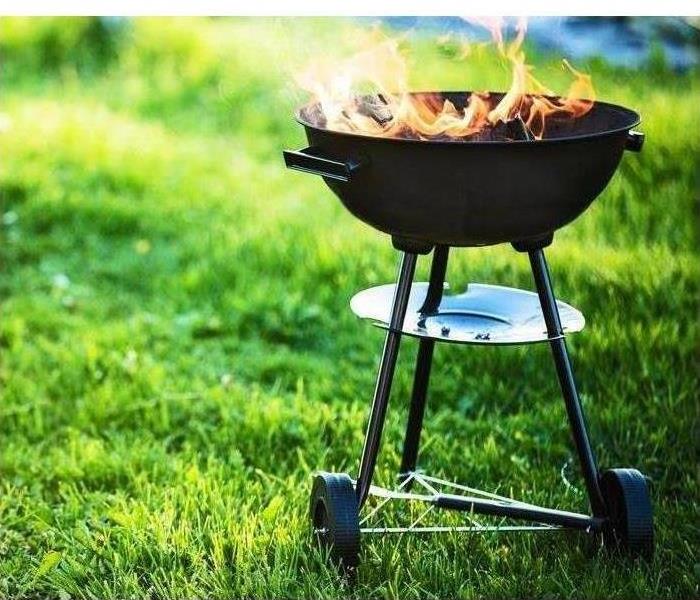 Enjoy grilling season.
Enjoy grilling season.
Grill Maintenance Is Essential
Nothing says summer in Suwanee, GA, like the smell of your favorite foods on the grill. When the temperatures climb, it may feel easier to take dinner prep outdoors rather than sweat over a hot stove. However, it's important to clean your grill every time you use it. Not only does this prolong the life of the appliance, but it protects your home from fires as well. In a survey between 2014-2018, over 10,600 home fires were linked to grills and barbecues. A buildup of oil and grease makes your grill more susceptible to putting up large flames that can catch onto porches, roofs, and dry grass. Proper grill maintenance is essential for keeping your favorite summer activity safe.
1. Clean the Grates
Proper grill cleaning after every meal makes maintenance much easier. For either a gas or charcoal grill, scrub the grates while they're still hot and before the food particles stick too badly. Some people like wire brushes, though balled-up aluminum foil also works and won't leave little bristles behind.
2. Check for Grease or Ashes
Avoiding grease fires is a top priority with gas grills. Before you turn on the grill, check the grease tray. If it gets overfilled, you'll be cleaning grease spots off your patio. Similarly, always dispose of all completely cooled ashes from your charcoal barbecue.
3. Deep Clean Annually
When grilling season ends, deep grill cleaning saves your grill and prevents problems next season. Kicking off the season the next year with a fire due to an improperly maintained grill can put a major damper on your next barbecue.
4. Know Grease Fire Safety
Educate yourself on how to extinguish a fire in your grill. Never use water, as water can actually make a grease fire worse. Closing the lid is a good first step because it stops oxygen flow to the flames. If you do have a home fire, a local fire restoration company can help with repairs.
Enjoy grilling season to the fullest by practicing good grill cleaning habits to protect your home and your dinner.
Am I required to Have Commercial Flood Insurance?
3/30/2021 (Permalink)
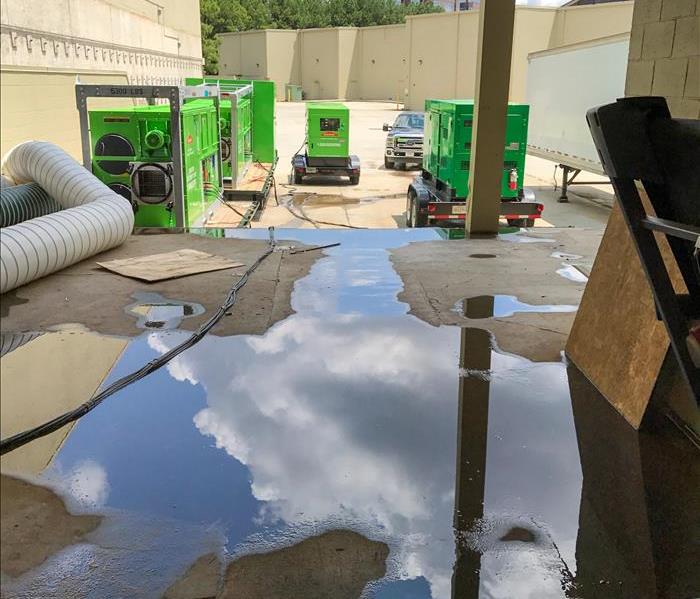 We can help remove the floodwater from your business.
We can help remove the floodwater from your business.
Three Factors That Will Determine If It's Mandatory
Floods are one of nature’s most destructive processes. They can have a terrible death toll and carry toxic residue into every nook and cranny of commercial buildings. Unfortunately, this damage isn’t covered by your commercial insurance policy.
If you want or need coverage, you’ll need either a rider from your insurance provider or you’ll have to purchase a special flood policy to be covered.
So, Is flood insurance optional? Well, that depends on your situation.
1. Are You in a High-Risk Flood Zone?
FEMA has flood maps available for much of the United States. If your building in Suwanee, GA is in a zone marked high-risk, you may have to have a flood policy. Some areas don’t have digital map data available, so you may have to consult your local authorities.
If your building is in a high-risk area, you probably should invest in flood coverage even if it's not required. Also, ask your local water damage restoration expert about having an assessment done on the property and develop an emergency plan in case of disaster.
Also, it’s always wise to consult flood maps before purchasing a commercial building. Local and state laws may require high-risk properties to be backfilled so the building is above the flood line, so definitely do your research!
2. Do You Have a Commercial Mortgage?
If a building has a mortgage on it, your lender may require you to have flood insurance. A few commercial insurance providers do have riders to cover flood damage, but most property owners prefer to use the NFIP flood policy, since it’s subsidized, lowering your premiums.
3. Is Your Lender Federally Insured?
To make mortgages more affordable, many are backed by federal insurance. These are typically called conventional mortgages. If you have a mortgage, your lender is covered by federal regulations and the building is in a high-risk flood zone, you’ll need coverage.
Ask your insurance agent or attorney if it applies to you. However, many experts recommend getting commercial flood insurance anyway. It can be the difference between closing your doors or staying open after a disaster.
Tips for Spotting and Fixing Water Damage
3/9/2021 (Permalink)
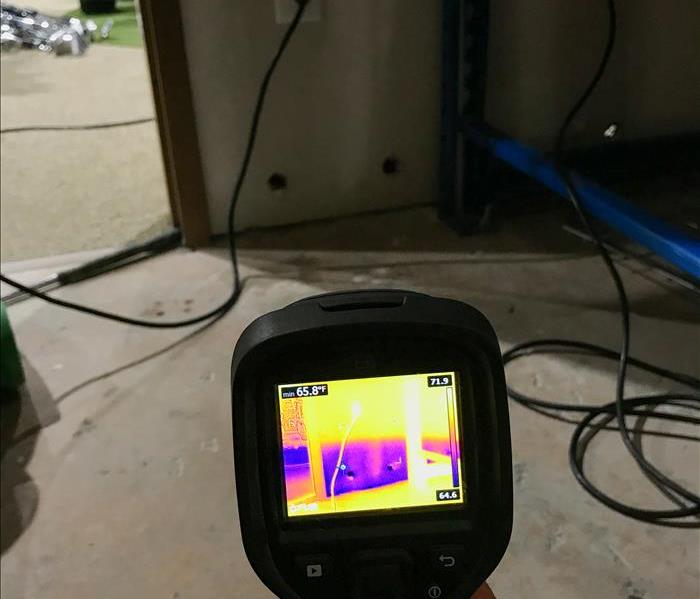 A water loss that led to mold damage.
A water loss that led to mold damage.
Water damage is a fairly common household problem. Pipes, over time, may develop weaknesses, allowing water to drip out and infiltrate the walls. The prompt reaction is essential to minimize the devastation; therefore, homeowners should understand how to notice early symptoms of the condition and be aware of ways to develop.
How Can You Spot Trouble?
Leaky or broken pipes may begin small, permitting moisture to seep into walls and crawl spaces. These places are hard to locate, allowing the saturation to develop over time. Owners are likely to start seeing outward signs after the concerns buildup. Try to catch water penetration early by keeping an eye out for the following symptoms:
- Discoloration or staining
- Rust buildup
- Warped floorboards
- Peeling paint
- Musty odors
How Should You Tend to the Issue?
Once you identify water damage, act swiftly to mitigate the impacted room. Locate a water restoration company in Buford, GA, to examine the area. The specialists use moisture reading tools to determine the extent of flooding and test samples of the drywall and air, looking for mold and mildew.
Focus on drying out space as much as possible. Run industrial dehumidifiers to extract moisture from the air and structure. Tear out drenched, porous materials. They harbor too much humidity and could allow mold and mildew to grow. Scrub the walls, and disinfect the premises to ensure fungus remains at bay.
How Do You Prevent Future Complications?
With water cleanup complete, concentrate on avoiding additional harm. Run the air handler to maintain a cool environment and monitor the humidity levels. Also, have professional plumbers inspect pipes regularly, checking for drips or structural changes. Making these small changes early could reduce the likelihood of major breaks.
Be on the lookout for unusual shifts in the home’s state. Water damage is best caught early to lower the costs of repairs and save owners significant hassles.
The Importance of Corporate Resources After a Large Disaster
2/19/2021 (Permalink)
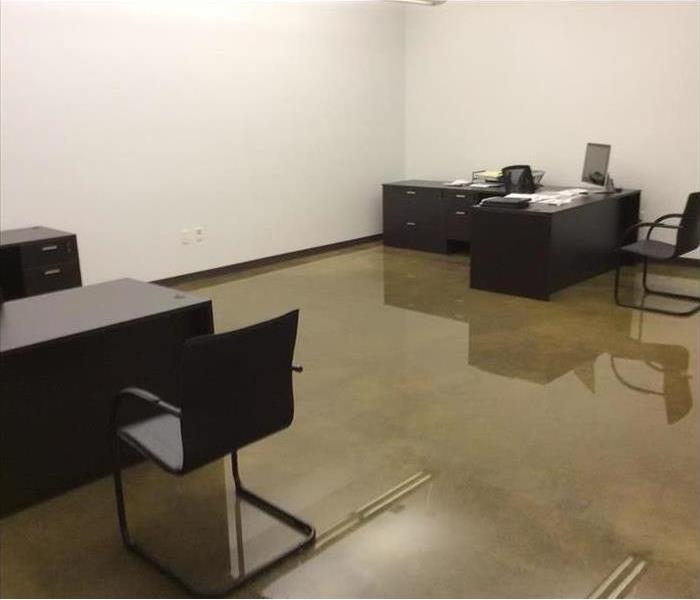 In a major flooding event, local franchises can become overwhelmed.
In a major flooding event, local franchises can become overwhelmed.
The Importance of Corporate Resources After a Large Disaster
Many disasters are simply local events that impact one or two companies. These situations include localized storm issues, a company fire, or a broken plumbing system in a school or office. Other times, though, a disaster impacts a much wider area with many companies and homeowners suffering a catastrophic loss all at once. The California wildfires are a good example of this widespread damage, as are the recent floods of Midland, Michigan caused by a dam breach. At this time, the 1,700 SERVPRO franchises that operate across North America often pool their resources to help the wider community. This allows more people to be helped in a timely fashion.
Corporate Strength
In a major flooding event, local franchises can become overwhelmed. When hundreds of homes and businesses are instantaneously dealing with flooded properties, only so many can be helped by the franchises in Buford, GA. By bringing in other professional restoration service franchises, the following benefits result:
- Additional equipment
- More workers
- More expertise
- Faster response times
- Reduced damages
Overall, this results in a smaller catastrophic loss for the impacted community. A multitude of crews coming together means critical issues can be addressed without delays. More specialized equipment on hand enables crews to pump out standing water, dry out flooded areas of buildings and respond to dangerous situations.
Local Knowledge
In coordination with local resources, SERVPRO's Disaster Recovery Team mobilizes as needed to help with widespread storm damage and other issues. This has been a successful model to help devastated communities recover from large-scale events for many years. Communities across North America have benefitted from this pooling of valuable resources of equipment and knowledge. Whether it is a large hurricane along the coast or major flooding in the heartland, communities can count on a robust response from professionals.
A catastrophic loss can be minimized by a coordinated response. Local knowledge and corporate strength is a potent combination for handling disasters.
Tips To Protect Your Business From Disaster
2/11/2021 (Permalink)
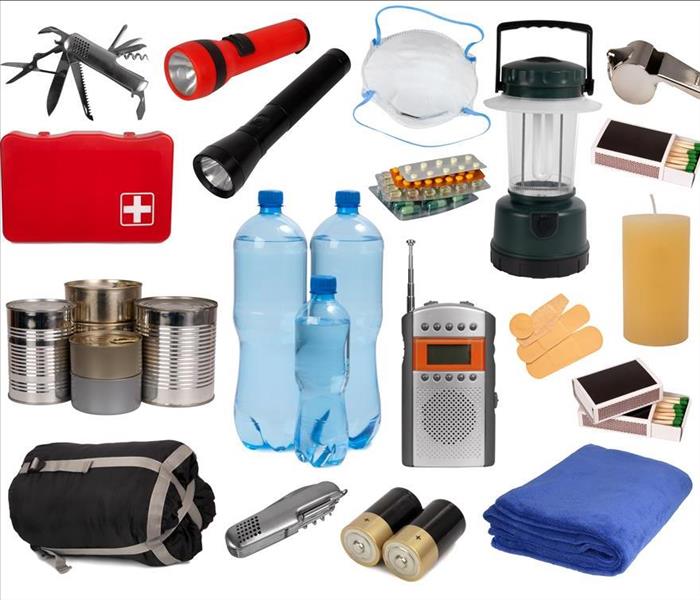 Emergency kit supplies.
Emergency kit supplies.
When severe weather strikes, you are undoubtedly worried about protecting your business. A tornado, hurricane, or severe downpour can cause flooding and physical damage to your building and affect your ability to sustain your regular business practices. Designing a custom emergency response plan can be invaluable if your Buford, GA business experiences a serious disruption.
Your Business Continuity Plan
Having a plan that addresses all types of potential damage is essential to your company’s risk-management strategy. These steps may help you create a solid plan that protects you.
Identify the risks particular to your business, such as a nearby flood plain, coastal hurricane vulnerability or a basement that often floods.
Assess the potential impacts on your staff, your property and your daily operations for each risk category.
Outline preventive measures that address each risk area, such as flood-prevention maintenance or fire-safety planning.
Formulate the specific steps to be followed by you and your staff in case of an emergency.
Regularly review, update and test your business continuity plan with live drills.
A well-designed plan can give you and your workforce a better chance of working together to prevent damage and minimize property loss.
Emergency Preparedness Tips
As part of your plan, you may want to keep an emergency kit on site. The kit might include items such as water, flashlights, extra batteries, protein bars, and a medical first-aid kit. It is also important to make sure you have fire extinguishers placed throughout your building. Many businesses find that a local fire department or disaster remediation service will happily offer your staff training in fire extinguisher operation, evacuation procedures and other preventive measures. For more detailed information about continuity planning and disaster preparedness, you can consult government resources like Health and Human Services or Federal Emergency Management Agency.
This brief overview may help you formulate a business continuity plan that can both protect your business and your peace of mind. Disaster preparedness may not be at the top of your list, but it can make a big difference when your property and your bottom line are threatened by an emergency.
Steps To Remove Commercial Mold
2/2/2021 (Permalink)
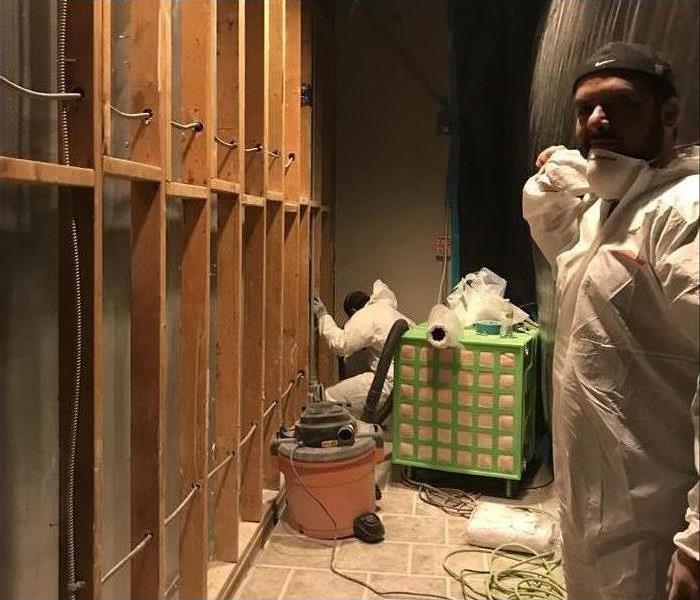 SERVPRO can handle any mold removal
SERVPRO can handle any mold removal
Mold Remediation Steps
Mold loves moist, dark areas in your commercial building. If left unattended, mold growth can cause extensive damage to your facility in Sugar Hill, GA. To eliminate a mold problem, it’s important to understand the typical steps involved in mold remediation.
1. Call an Expert
Don’t try to clean up the mold yourself. Contact a mold remediation expert as soon as possible to lead the effort. The professionals will follow the steps below, as necessary.
2. Assess and Inspect the Facility
Professionals assess the situation by looking for water damage and mold using technological equipment.
3. Contain the Mold
High humidity can trigger further growth quickly, so experts use containment procedures to reduce the risk of spreading mold. Negative air chambers are used to keep affected areas from contaminating other areas. HVAC systems and fans are turned off to discourage mold growth.
4. Utilize Air Filtration Equipment
Air filtration systems help capture and remove mold spores from the air, along with HEPA vacuums and air scrubbers.
5. Remove Moldy Materials and Clean Surfaces
The amount of mold remediation necessary depends on the amount of mold and the texture of the surfaces. Applications using antimicrobial treatments eliminate colonies of mold and reduce the likelihood that they will return. Porous materials containing mold are carefully removed and disposed of properly.
Materials that can be salvaged, such as drywall, furniture and carpeting, are cleaned and sanitized using specialized cleaning techniques. Odors can also be removed from these materials with deodorizing treatments and fogging equipment.
6. Restore the Premises
The level of restoration is dependent on the amount of damage to structures and surfaces. For example, restoration might only include replacing a few sheets of drywall or installing new flooring. If subfloors or other key structures are damaged, major reconstruction may be necessary.
If you are concerned about mold growth in your building, don’t hesitate to call a professional right away.
Is Business Interruption Insurance Worth It?
2/2/2021 (Permalink)
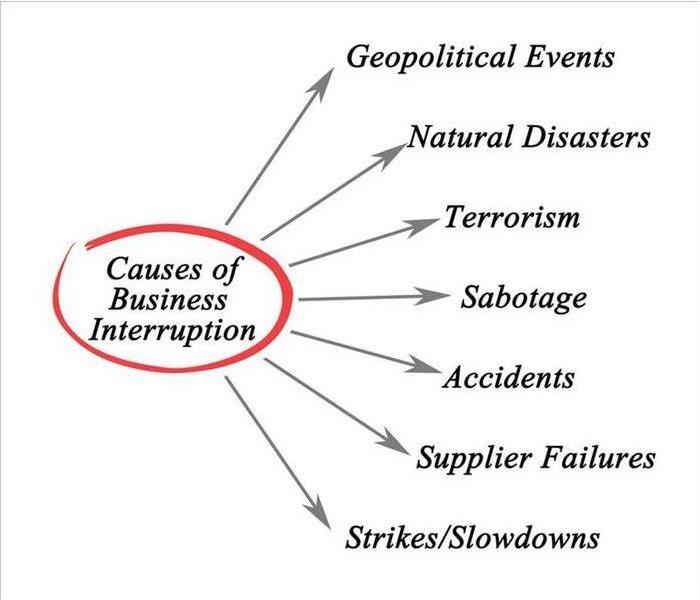 Interruption insurance eases the pain by covering employees’ wages until payroll resumes
Interruption insurance eases the pain by covering employees’ wages until payroll resumes
4 Types of Losses That Business Interruption Insurance Covers
Choosing insurance can be a confusing and time-consuming process, weighing affordability against necessity. When it comes to protecting your business, interruption insurance may be overlooked, yet it can be a business-saver in the event of a disaster. Your business could be out of service for a month or more for restoration purposes. Property insurance covers physical assets, but what doesn’t it cover? Here are four types of losses that business interruption insurance covers that property insurance doesn’t:
1. Lost Profits
If your business is unable to run properly, time out of service will mean profit loss. Typically the insurance company will assess recent profits and reimburse the expected loss amount.
2. Lost Employee Wages
Employees can’t be without work for long without wages. More than a few weeks without a paycheck could be a deal-breaker for employees living paycheck to paycheck. Interruption insurance eases the pain by covering employees’ wages until payroll resumes.
3. Temporary Operating Location
Especially in the event of a fire, the building might be so damaged that you can’t work out of that location. Fire restoration experts will probably be required to get your business up and running again as soon as possible. A temporary location could be necessary to keep your business afloat. Business interruption insurance can cover relocation and operation costs.
4. Lease and Loans
Monthly lease and loan payments will continue to come due. This insurance might cover some of those costs (e.g., building and machinery). Eviction or repossession is a real possibility if a payment is more than a couple of months late so having this kind of coverage could be critical to the survival of your business.
As a business owner in Rest Haven, GA, you need the assurance that your enterprise will survive the worst calamity. You’ll want to weigh the cost of the interruption insurance against what you can afford and what you can’t afford to lose. Creating a plan for a potential disaster can diminish worries before and after a catastrophic event. This will allow you to concentrate on keeping your company financially secure until your business can be restored.
Tips for Maintaining Your Sump Pump
1/15/2021 (Permalink)
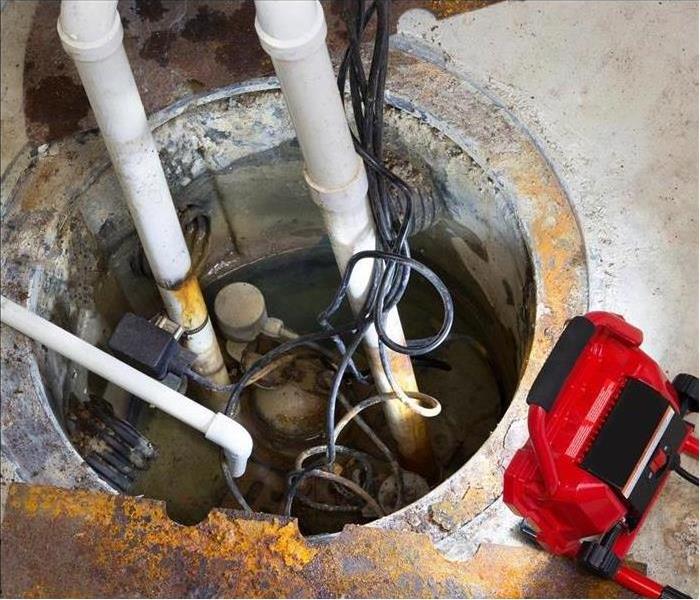 Ensure that your pump remains in good working order
Ensure that your pump remains in good working order
A sump pump drains water from the sump basin in the basement of your house in Hamilton Mill, GA. Regular pump maintenance will keep it in the best condition possible to keep your basement and entire home dry.
Keep It Clean
Water passing through the earth around your home can carry fine dirt particles that it deposits in the pump. It is necessary to clear these particles regularly to allow the pump to drain effectively. Unplug the pump and pour a bottle of vinegar into the sump pit. Allow the vinegar to sit for about 30 minutes to break up the debris before restoring the power. Flush out dirt particles by pouring hot water into the pit.
Perform Routine Inspections
Pump maintenance and inspections are essential for detecting problems and issues that can lead to costly basement flood damage repairs. Ensure that your pump remains in good working order by checking various features, including:
- Check valve. When the pump shuts off, this part prevents gravity from pulling water back into the pit. This part prevents pumped water from re-entering the sump pit where it requires repumping.
- Float. Checking the float for jams ensures that the pump turns on and off appropriately.
- Positioning. Ensuring the pump's upright position is necessary to prevent it from tipping over while vibrating.
- Cover. A poorly-fitting pump lid can elevate the humidity within a home, increasing the risk for damage from mold formation that requires the intervention of a professional mold remediation service.
- Alarm. If the pump malfunctions, a reliable alarm system can issue an alert to prevent a flood from occurring.
Install a Backup Generator
Power outages are common reasons for sump pump failures. A backup generator that kicks in during power outages will ensure the pump's uninterrupted function.
Routine sump pump inspections are a critical part of the measures necessary to maintain your home in Hamilton Mill, GA.
3 Ways To Prevent Bursting Pipes in the Winter
12/28/2020 (Permalink)
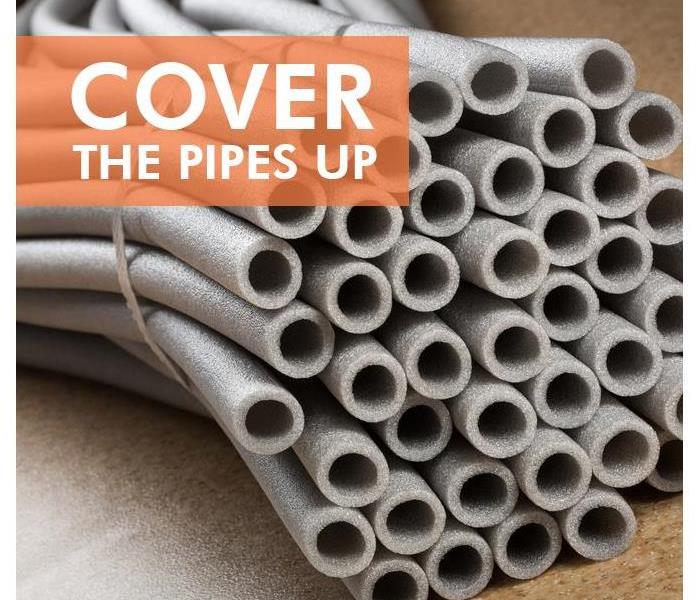 Insulate your pipes
Insulate your pipes
Ways To Prevent Bursting Pipes In The Winter
Throughout the winter, homeowners in Suwanee, GA, know they must prepare adequately to prevent a house flood. Causes for bursting pipes include:
- Frozen pipes
- High water pressure
- Old plumbing systems
The aftermath of a burst pipe can be devastating for your home, causing severe water damage to your property and hours of water cleanup. During colder times of the year, you can ensure your pipes are protected from the frost by taking these steps.
1. Insulate Your Pipes
Installing insulation around your pipes before winter begins protects them from freezing temperatures. Insulation keeps the cold air from affecting any exposed or external plumbing. Though it may seem costly initially, a layer of insulation keeps your pipes protected for years after having it installed, saving you from the more expensive repairs and water damage restoration service needed after bursting pipes.
2. Open Your Faucets to a Drip
Due to the freezing cold temperatures, burst pipes are more frequent during the winter. Frozen water inside of the pipes increases the water pressure. The increased pressure builds and eventually causes the pipes to burst. Keeping the water running at a drip relieves the water pressure inside of the pipes, keeping them from bursting.
3. Open Cabinets in Bathrooms and Kitchens
Allowing the warm air in your house to travel around water supply lines, which are located in your kitchen and bathroom, can keep them warm enough to prevent freezing inside the pipes. This avoids any burst water supply lines. To protect water supply lines during the winter, open the cabinets where this plumbing is located so your heated air can reach them.
Avoid having to call a plumber to fix a broken pipe by taking preventative measures before and during winter. Preparing for the winter can ensure your plumbing is protected from freezing temperatures and save you the cost of repairs from bursting pipes.
How a Fire Sprinkler System Works
12/28/2020 (Permalink)
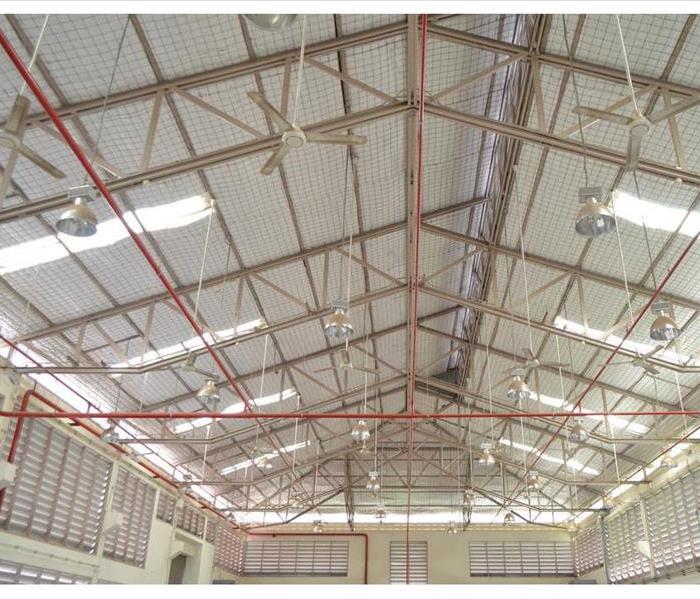 Fire sprinkler system
Fire sprinkler system
If you have a fire sprinkler system at your business property in Buford, GA, you have hopefully never seen the system in action. However, it's a good idea to know how it functions.
Parts of a Sprinkler System
The typical sprinkler consists of:
- Pipes containing water under pressure
- Plug that holds back the water
- Glycerin-filled glass bulb holding the plug in place
- Deflector that sprays water around the fire area
A network of pipes runs between the individual sprinkler heads. The water is always in the piping, meaning the system is ready to initiate fire suppression when activated.
Conditions for Activation
If a fire starts, the air temperature above it will rise. When it reaches about 160 degrees Fahrenheit, the glycerin will expand and break the bulb, springing open the plug. Water leaves the pipe, and the deflector sprays it around the room. Because the glycerin responds only to temperature, smoke alone will not activate the fire sprinkler system. If the fire spreads, the hot air will activate other sprinklers, but only the ones triggered by the rise in temperature will go off.
Advantages of a Sprinkler System
What makes a sprinkler system so effective is that it works quickly. Before the fire department can arrive, the system has begun fire suppression. In many cases, the system will contain and possibly extinguish the fire. Your property may experience less damage than it would without the system. Fire sprinkler cleanup and professional restoration may also be easier. The fire may be better contained and extinguished with less water than a fire that had the chance to spread before firefighters arrive.
Common Sprinkler System Myths
In the movies, it seems that a small trigger sets off a room full of sprinklers. However, that's not the way a system works. It's activated by high heat, so candles and toasters will not set it off, and only the sprinklers above the heat will activate.
If you haven't installed a fire sprinkler system in your business, it's worth considering. In the event of a fire, a sprinkler system can give your business added protection.
How To Handle a Major Water Problem
12/15/2020 (Permalink)
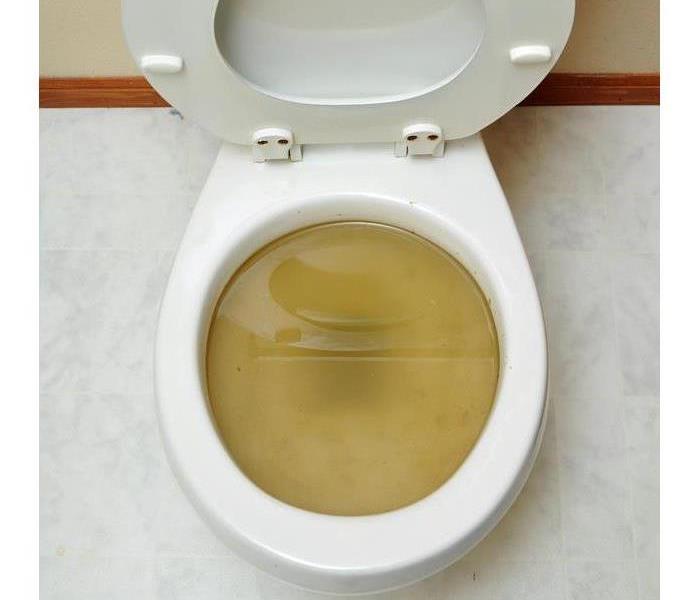 One common instance of sewer damage is when a full toilet overflows
One common instance of sewer damage is when a full toilet overflows
When it comes to water damage in your commercial building in Buford, GA, each situation is unique. Some problems are straightforward, while others require the expertise of a professional water remediation franchise. Any situation that involves sewer damage is more complicated. That's because contaminated water not only poses a threat to humans but also can cause more damage to ceilings, flooring, walls and insulation.
As in all cases of damage from water, the source of the problem should be stopped right away. This is followed by an inspection and assessment of the impacted area by certified technicians. They will then develop an appropriate restoration plan.
Dealing With Toilet Overflow
One common instance of sewer damage is when a full toilet overflows. If the toilet is on a second floor or higher, the water can penetrate the flooring and then leak down into the floor below. When this happens, professional technicians can take the following actions:
- Arrive on site fast and wearing PPE
- Stop the source of the contamination
- Restore all flooring and ceiling materials
- Disinfect and sanitize the area
You should consult your insurance agent as soon as you can. The agent can advise you on what portions of the damages and expenses are covered. Having a professional sewage company deal with a flooded toilet is likely to produce the best results.
Handling Other Sewage Damage Scenarios
Raw sewage coming into your place of business is a serious situation. It can happen in a number of ways. A sewage backup can occur when an outgoing line becomes clogged with obstructions such as a rock or tree roots. Another possibility is when a sewage line pipe breaks due to old age or some sort of trauma. A third possibility is a flood that brings in contaminated water from the outside of your building.
Whatever the cause of the problem, sewer damage situations are best handled by professionals with the training and equipment to deal with complicated restorations.
How To Find Mold Even If You Can't See It
12/8/2020 (Permalink)
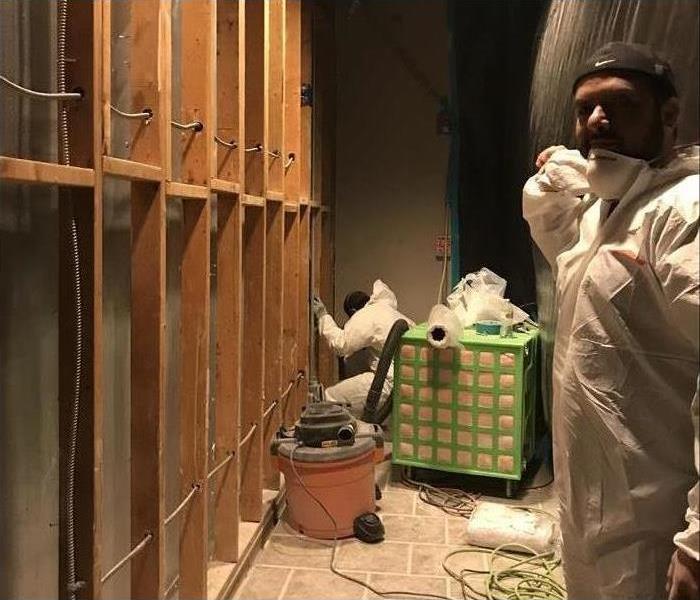 Mold remediation services in Buford, GA
Mold remediation services in Buford, GA
Ways To Help You Decide If You Need Mold Remediation Specialists
You're faced with a dilemma. You know that there's a mildew smell in the office, but you've checked everywhere you can think of and you still don't see any signs of mold. Do you shrug and ignore it, maybe run an oil diffuser and hope it goes away? That's an option, but just because you can't see mold doesn't mean that it isn't there. Noticing a mold smell is a pretty good indicator that something isn't right, even if you can't see it. Here are some ways to help you decide if you need a mold remediation specialist to visit your office in Buford, GA.
1. Smell
You know that a fungus smell likely indicates mold, but why? Mold emits gases at various stages of its growth. Mold itself is not smelly; it's the compounds that are released into the air by the mold that smell bad. If you're smelling a mold smell, you can be fairly confident that there is mold growing somewhere.
2. Sight
Mold doesn't just look like the black, blue, or gray spots you find on leftovers that have been in the fridge for too long. Mildew, which is just early-stage mold, might look to you like dirt. Especially in basements or storage areas that aren't regularly visited by your cleaning crew, don't just write off a dirty surface as just needing a wet rag. It might be early signs of mold.
3. Infrared
Sometimes, the only way to tell whether or not there is mold is to look behind walls. Thankfully, infrared technology makes it possible to check for leaks, the extent of any possible damage, and energy leaks that may be allowing moisture into the building without tearing down walls. Infrared doesn't identify mold, but it identifies mold-friendly conditions that are of concern to mold inspectors.
A mold smell in your facility likely indicates a problem. Hoping that the smell will go away probably isn't going to work. Instead, have a professional come to assess your building so that you can get the problem taken care of quickly.
Does Homeowner’s Insurance Cover a Fire?
12/8/2020 (Permalink)
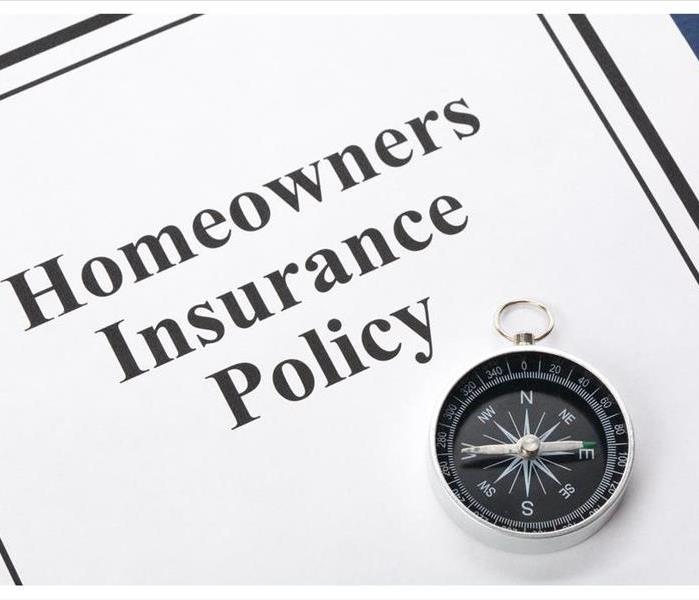 Buy homeowner's insurance to protect your home and belongins
Buy homeowner's insurance to protect your home and belongins
What Is Covered By Your Insurance Policy
You buy homeowner's insurance to protect your home and belongings. Generally, they will help pay for damage from a disaster, such as a home fire. Whether it is started by arson or a cooking disaster, a fire can consume your home and belongings. Afterward, you will probably need to hire qualified restoration professionals to repair the damage. To prepare yourself for this situation, you should know what is covered by your insurance policy.
What Is Covered?
When an accidental home fire strikes, your insurance company will generally pay for the fire damage to be repaired on your listed buildings. This can include:
- House
- Sheds
- Garages
- Barns
- Fences
- Personal belongings
How Much Coverage Do You Need?
Your coverage limit should be tailored to your home. The limit is the maximum amount you will receive after a home fire. This means you should choose a limit that will cover your home, outbuildings, and personal belongings. When purchasing coverage, you will likely see personal property and dwelling limits.
Personal property limits cover the cost of replacing personal property damaged during a fire. However, your policy may not cover the entire value of certain items. For instance, you may want to purchase additional policies for any expensive jewelry you have so you can replace them.
What Is Not Covered?
Homeowner's insurance does not cover all types of fire. For instance, if you intentionally set fire to an empty house on your property, you will not be reimbursed. Additionally, any fires caused by wars are not covered. For more details, you should read your policy thoroughly to see what is not covered.
Knowing more about your homeowner's insurance policy will help you be prepared in the event of a fire. While an intentionally set vacant home fire is not covered, fires that started on accident in your home in Buford, GA, will generally be covered.
Will Your Rental Policy Cover Mold Damage?
11/24/2020 (Permalink)
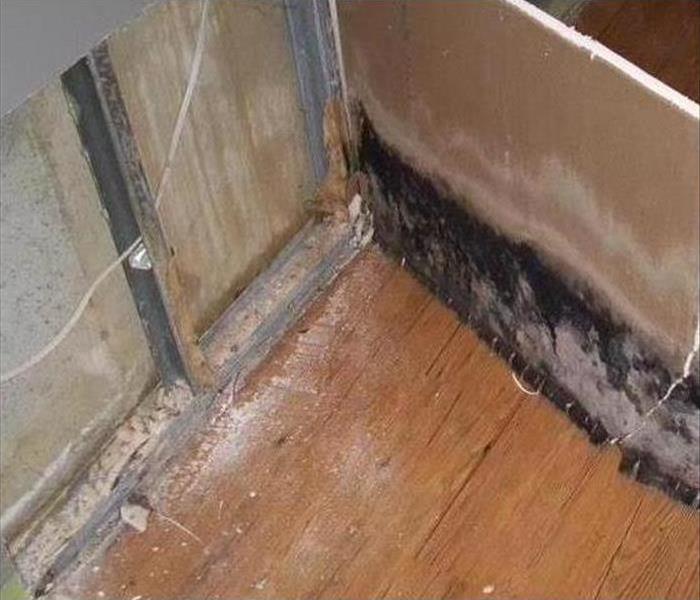 Black mold damage in Hamilton Mill, GA
Black mold damage in Hamilton Mill, GA
Rental insurance can be a bit confusing. It is sometimes unclear what your policy does not cover. Mold insurance, in particular, is often complex. Below is a rundown of when your renters' policy covers mold damage.
When Mold Is Covered
Your insurance should pay for any mold that results from an accidental and sudden peril. Many disasters fall into this category, including:
- Windstorms
- Hail
- Theft
- Fire
- Lightning
- Vandalism
- Volcanic eruptions
However, since mold thrives in wet conditions, the spores are most common following interior floods, HVAC leaks or pipe bursts. If you experience one of these scenarios, call emergency restoration experts in Hamilton Mill, GA, immediately. They can repair and disinfect your belongings before the mold growth begins. Your insurance should pay for the cost of this service. The policy will also cover any necessary mold removal and cleanup.
Don’t forget that your rental insurance only covers damage to your personal property. Any harm to the actual building is your landlord's responsibility.
When Mold Is Not Covered
Your rental insurance policy likely includes some mold exclusions. For instance, most renters' policies do not pay for any water or mold damage caused by external floods. These floods can result from sewer overflow, storm surges and heavy rains. However, you can purchase separate flood or sewer endorsements that should cover mold caused by these perils.
Insurers also will not cover mold that results from your negligence. If you leave out wet items or fail to remove standing water, the insurer may deem you liable for the damage and refuse to pay for the repairs.
How Much Damage Is Covered
Many insurance companies limit how much they will pay for mold claims. They may not give you more than a few thousand dollars per incident. You can purchase separate endorsements for your more valuable belongings, such as musical instruments, electronics and jewelry.
Rental insurance usually contains some mold coverage. However, that coverage may be limited, and it only applies in certain situations. Be sure to read over your policy so you understand exactly what is included.
5 Tips for Dealing With a Toilet Overflow
11/23/2020 (Permalink)
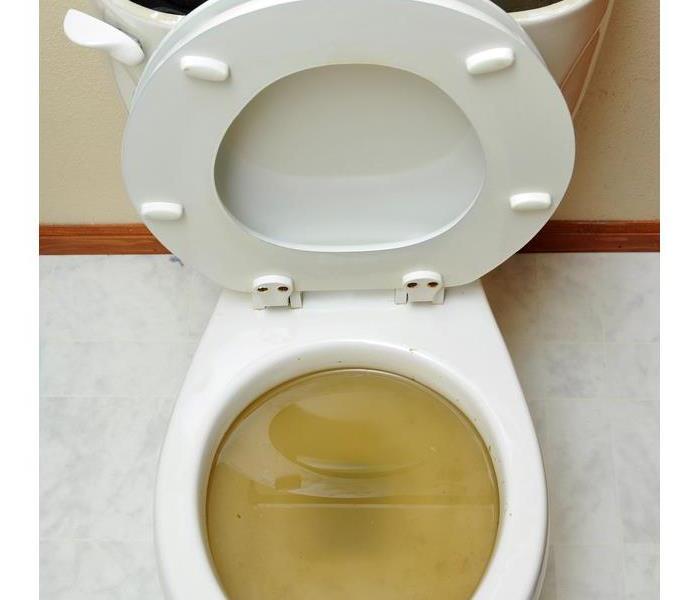 Toilet overflow in Buford, GA
Toilet overflow in Buford, GA
Here Are Five Tips For Dealing With This Type Of Problem
When dealing with sewer damage in your Buford, GA, home, you may be wondering what steps to take. Whether it’s overflow from a sewer main maintained by the sewage company, or a blockage that led to a flooded toilet, there’s some important things to remember about dealing with a toilet overflow.
1. Contact a Professional
One of the first things to consider any time you have a sewer problem in your home is to contact a local water damage restoration service. These professionals are trained to deal with a number of water damage types, including sewage backup. They will have the tools and training needed to do so safely.
2. Wear Safety Gear
Sewage is classified as black water meaning that it carries contaminants such as chemicals or bacteria. This is why it’s important to wear protective equipment any time you deal with it. This may include masks, gloves, shoe covers, and clothing covers.
3. Remove the Water
One of the first things you will see your sewer damage restoration team do is remove the water before additional problems can arise. They may use special pumps or vacuums for this job, and pay special attention to tights spaces where water may be hard to get at.
4. Dry the Space
Once the water is removed it is important to dry the space. This is to help prevent water from soaking in and causing additional problems such as swollen wood or mold.
5. Sanitize the Area
Because sewage is contaminated, after it is removed and the area dries, the space will need to be sanitized. Your restoration teach will use a variety of cleaners designed to work on the different affected surfaces.
It’s important to remember that sewer damage can be tricky to deal with. This is why it’s highly recommended to contact a professional restoration service for help. These professionals will have the correct safety gear needed for dealing with the problem so that they can remove the water, dry the area, and correctly sanitize the space. Soon your home can look “Like it never even happened.”
How Water Damage and Fire Damage Can Be Related
11/11/2020 (Permalink)
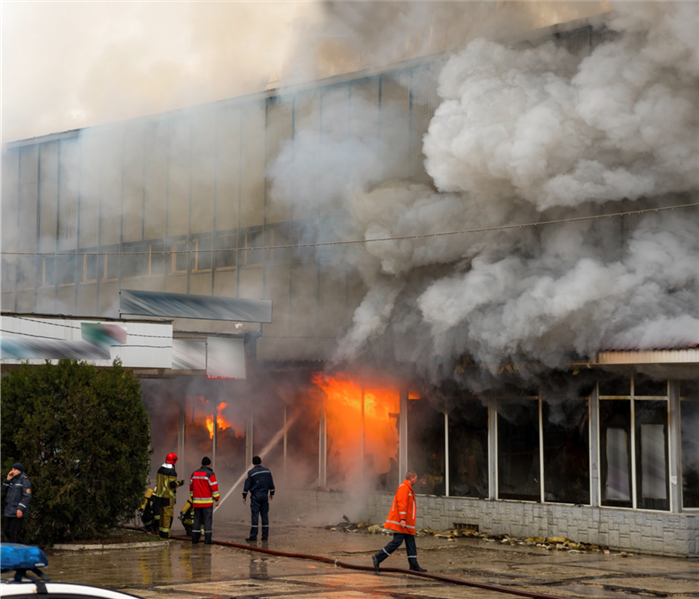 Commercial fire and water damage in Rest Haven, GA
Commercial fire and water damage in Rest Haven, GA
Here Are A Few Ways Water Damage Can Occur After A Fire
Believe it or not having to conduct a water cleanup at your Rest Haven, GA, place of business is something that many local fire restoration professionals anticipate any time they're called to a job. Much like needing to perform a smoke cleanup, a restoration evolving water damage is a normal part of a fire cleanup.
1. Fire Suppression
The suppression efforts used to put out the fire in the first place may also lead to water damage. For example, the use of a fire hose can cause flooding as a fire hose can pump out up to 500 gallons per minute. The fire may be put out, but water can be left behind. Similarly, suppressant released by an overhead sprinkler system may contain less water, but if allowed to sit it too can lead to water damage
2. Weather
After a fire, wet weather such as rain, hail or snow can cause problems which result in the need for a water cleanup. This typically occurs after the fire has weakened the exterior structure leaving holes that the weather can get through. The damp space left after a storm can turn into water damage if left unattended. This is why you may see your restoration service board or tarp over the building until repairs can be made.
3. Plumbing
Your plumbing can be affected by a fire as well. The heat can put stress on joints or thinner areas of metal, which can then weaken the pipes allowing them to possibly burst after a fire. This can result in flooding in these areas, and possible water damage. Fortunately, your local restoration service should be able to handle any clean up the repairs of this type of water damage.
Needing a water cleanup after a fire at your place of business is actually fairly expected. This is because things like a fire suppression efforts, wet weather, and problems with plumbing can all contribute to possible flooding. Fortunately, many local fire restoration professionals expect possible water damage and will know how to best restore the property.
3 Reasons You Need Business Insurance
11/11/2020 (Permalink)
 Paying for insurance regularly might not sound appealing, but it is better than the alternative
Paying for insurance regularly might not sound appealing, but it is better than the alternative
The Following Are A Few Reasons Why
If you own a business in Buford, GA, then there are steps that you should take to protect that business. One of these is purchasing insurance that covers water damage and other emergencies. It might seem like this is just an extra expense that you could do without, but this is not the case.
1. Repairs Can Be Expensive
Paying for insurance regularly might not sound appealing, but it is better than the alternative. If you are dealing with broken pipes or something else that causes flooding in the building, the cost of repairs can be high. Not only can it affect the building, but it can also cause damage to the items within it. Without insurance, you will be stuck paying for repairs and replacements on your own, which will cost your business a lot of money.
2. Water Damage Is a Common Occurrence
Many people like to think that, while bad things happen to other people, a disaster probably won’t happen to them. Unfortunately, water causes damage often, and chances are it will affect your building at some point. Whether it comes from a storm, leak or broken appliance, insurance can be a lifesaver in this situation.
3. You Could Lose Profits During Restoration
If the damage is severe, then water cleanup and repairs can take a while. Sometimes, building materials such as drywall or insulation need to be torn out and replaced. Mold growth can occur as well. If you are unable to operate your business as usual during this time, insurance can help minimize loss.
Restoration should be done as soon as possible to reduce secondary damage. Hiring a water damage remediation company is your best bet for getting your business ready to go again quickly, and insurance helps ensure you can cover those costs as you get up and running.
3 Ways To Directly Prevent Floods in Your Town
11/11/2020 (Permalink)
 Retaining walls are built to separate land at two distinct heights
Retaining walls are built to separate land at two distinct heights
How To Prevent Floods Directly
Cleaning up after a flood in Suwanee, GA can be a long and arduous process. Therefore, you may save time, money and energy by proactively preparing for a stormwater issue. The money aspect is especially prevalent as insurance companies don't tend to cover flood cleaning. While some storm preparation techniques require years to come into effect, the following are three ways to prevent floods directly.
Plant Strategic Foliage
The plants throughout your town aren't just there to look pretty. There are many practical uses for this vegetation, one of which is flood prevention. Flooding water has a lot of force behind it. This force causes harmful erosion and the general build-up of water. Plants have the ability to combat this by acting as a blockade. The foliage can disrupt a current and spread the water. Here are a few plants that accomplish this:
Create Detention Basins
Since the flow of water is the main creation of flooding, utilizing a method that regulates it is wise. Detention basins are ponds that receive water and control its exit. These reservoirs are generally built near significant bodies of water, which promotes effectiveness. The basins are particularly successful at flood prevention due to the more detail-oriented structuring involved.
Construct Retaining Walls
Erosion is a particular issue caused by storms, but it can be lessened through the construction of retaining walls. Retaining walls are built to separate land at two distinct heights. While these walls may be chiefly meant to contain soil, the effect of detaching earth from the street is helpful. Water is forced to stay on the street and avoid picking up dirt.
If you are able to, it's better to prevent an issue than to confront it. The storm damage restoration process will be far easier if proactive measures are taken. Ergo, flood prevention is important to keep in mind for maintaining your city's welfare.
How To Prepare For a Canceled Flight
10/20/2020 (Permalink)
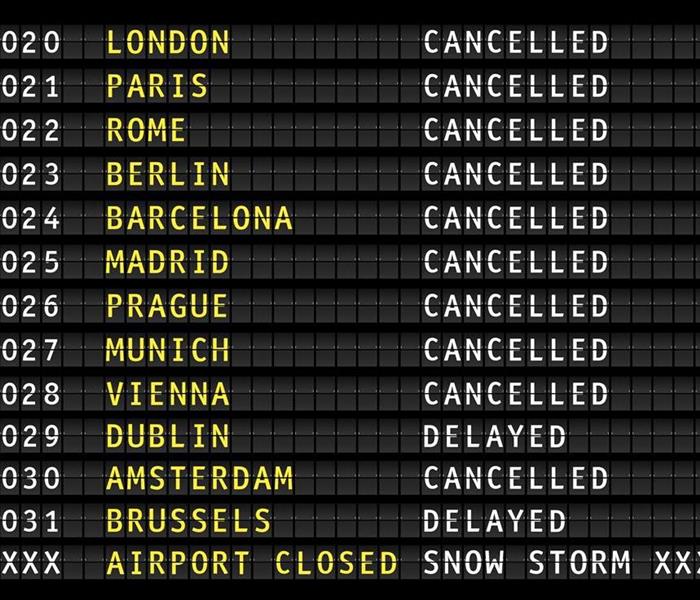 Canceled flight information board
Canceled flight information board
Prepare For a Canceled Flight
Traveling during the winter and fall from Dacula, GA can be risky. Storms can shut down entire cities, including their airports. Here are some things you can do to be prepared for a canceled flight.
1. Pack Light
If there is a threat of bad weather around the time that you're flying, set yourself up for success by packing light. It's much easier to switch flights quickly and end up with all your baggage if you pack in a carryon. If you do need to check it, make sure your carryon contains an extra change of clothes and the essential toiletries you'll need to survive without your suitcase for a night or two. Bring an external charger for your phone so that you aren't fighting the rest of the passengers on your flight for an outlet, and load your bag with plenty of snacks.
2. Call the Airline
If you do have a canceled flight, try calling the airline before you go to the customer service desk. This can often help you rebook faster since you aren't waiting in line. No matter who you talk to, though, remember to always be polite and gracious. It's not the customer service representative's fault that your flight was canceled, and they're the ones who are going to be able to help you. Make sure you ask about any compensation the airline can provide for you, like meal vouchers or a hotel room.
3. Get Comfortable
If it's looking doubtful that you're going to get another flight any time soon, turn your attention to booking a hotel room. It's likely that there was more than one flight that was canceled, so rooms may go quickly. Look up local storm tips to see what safety precautions you should be aware of while you're staying. If the area where you live is being hit, you can use this opportunity to look up a storm damage remediation company to call to take care of your home as well.
While a canceled flight can throw your day into chaos, being prepared for the possibility can make it go much more smoothly.
Performing a Water Heater Flush
10/13/2020 (Permalink)
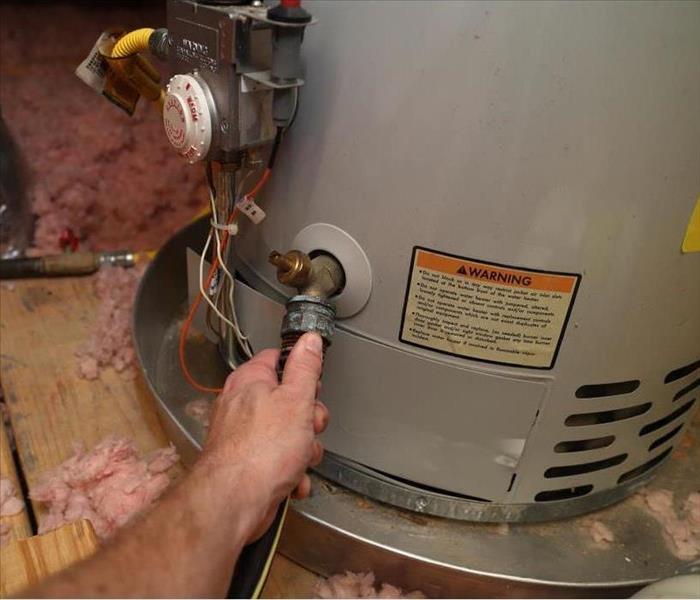 Performing a flush is an excellent way to keep your water heater properly maintained
Performing a flush is an excellent way to keep your water heater properly maintained
Steps To Perform a Water Heater Flush
Proper water heater maintenance can help prevent unnecessary damage and repairs, as well as keep your device functioning properly for years to come. Performing a water heater flush is an essential, yet simple, task. Follow the steps below to perform a successful flush for your home in Sugar Hill, GA.
1. Deactivate the Machine.
If you have a gas model, simply extinguish the pilot light. If you have an electric model, go to the circuit box and deactivate the line supplying the heater.
2. Prepare the Drainage Area and Connect the Garden Hose.
Designate a specific drainage area for your flush. The area you choose should be able to handle a significant amount of warm water flow, without running the risk of flooding your property. Connect one end of your garden hose to the heater's drain valve before running the opposite end into the designated drainage area.
3. Drain Your Tank.
Open your drain valve to let the water out. Allow it to flow for several minutes. During this time, you should head into your kitchen and activate the warm water faucet in your sink. This helps the water drain more smoothly. After a few minutes, turn off the supply valve. The water should gradually begin to slow before stopping altogether. Reopen the valve to run one more quick flush before shutting it off again.
4. Close the Valves and Refill the Tank.
Close your valves and turn your water supply back on. During this time, keep a close eye on the running faucet in your kitchen. You'll know that your heater's tank is full again once the water begins to run smoothly from the faucet.
5. Reactivate the Heating Element.
Refer to step one to reactivate your heater's power. You have now performed a successful water heater flush.
Performing a flush is an excellent way to keep your water heater properly maintained, ensuring that you'll be able to use the device for years to come. For more information or assistance maintaining your device, contact water remediation experts.
Getting Rid of Shower Mold
9/30/2020 (Permalink)
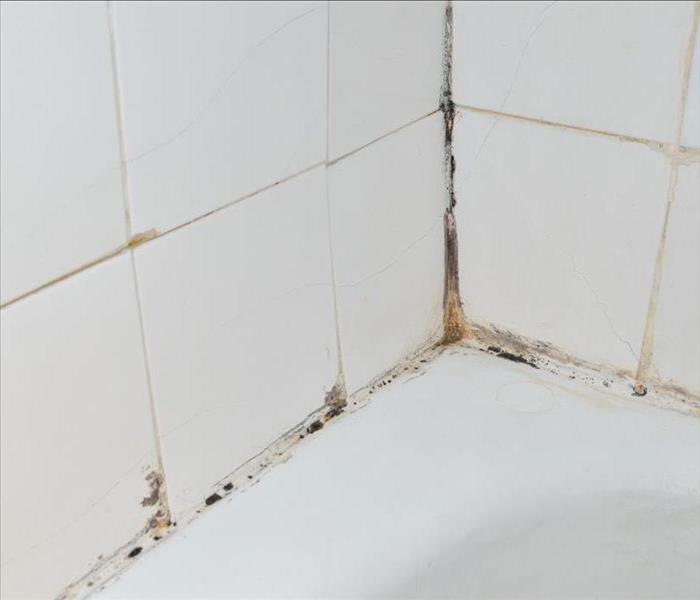 Black mold is a very common occurrence in your shower
Black mold is a very common occurrence in your shower
It's very common to find mold growing in your household bathroom. The moist, humid environment that your bathroom creates is an ideal fungal breeding ground. Shower mold is especially common, since it's the largest source of moisture in the entire bathroom. If your bathroom in Hamilton Mill, GA, is experiencing unwanted mold growth, you need to follow the technique below.
Cleaning a Moldy Shower
Black mold is a very common occurrence in your shower. Luckily, this means that there are plenty tried and true cleaning methods available. Here's how to perform one of the most effective techniques:
Create a safe, non-toxic mold cleaning solution using equal parts water and white vinegar. Pour this solution into a clean spray bottle.
Generously mist down the moldy areas with the cleaning solution. You should strive to create an even layer, without over-saturating. If puddles are forming in your shower basin, you're using too much solution. Let the mixture sit for 5-10 minutes.
Use a clean, dry cloth to wipe off the solution. The mold should easily come off with it. You may need to use multiple cleaning rags, depending on how large the affected area is.
Scrub down any remaining mold patches with a kitchen sponge or scrub brush. Mold that's growing in the shower grout or caulking can be removed using a spare toothbrush.
Dry the area completely using a fresh, dry cleaning rag. Make sure to wipe up all of the moisture in order to prevent further mold growth.
Preventing Bathroom Mold
Keeping your bathroom clean and dry is the best way to prevent future mold issues. Every time you take a shower, you need to make sure you're taking the time to dry the excessive moisture. This includes wiping down the tiles, the edge of the tub, the puddles on the floor, and the grout and caulking. Keeping a window open or a door cracked while taking a shower can also help prevent condensation from building up.
Shower mold is extremely common but relatively easy to resolve. If your mold issue spreads out of control, you need to contact mold remediation experts for help.
3 Important Things To Know About Fire and Insurance
9/18/2020 (Permalink)
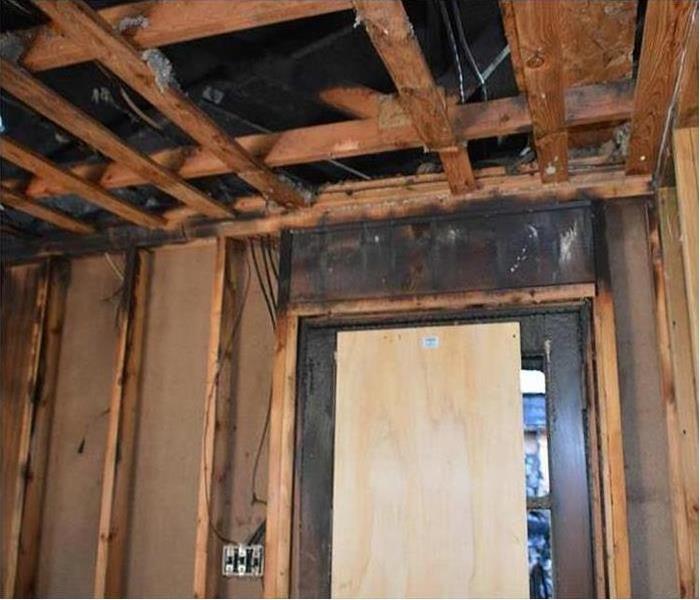 Fire damaged a structure in Suwanee, GA
Fire damaged a structure in Suwanee, GA
What Is and Isn't Cover In Your Insurance Policy?
A home fire in Suwanee, GA, in addition to its emotional and psychological costs, can be financially draining. Any repairs beyond a superficial burn can come with a hefty price tag. While homeowner's insurance should cover most fire damage claims, consumers need to have a good idea of what is and is not covered in their policy, and how to further protect themselves.
1. What Is Covered
Simply put, accidents. Whether it is a kitchen fire or an electrical wire falling on your house, most standard insurance policies will cover damage from fire and smoke to some degree.
2. What Is Not Covered
Arson is not covered. Insurance companies can rightfully deny any claim on an event that arose from a violation of the law. In fact, sometimes companies speculate that a fire was set on purpose in order to exclude a claim. Homeowners should work closely with fire officials and investigators to provide conclusive evidence that criminal intent was not the cause of a fire.
A vacant home fire also will not be covered. Generally, a residence that is unoccupied for more than 30 days is considered vacant. This is important to know for new homeowners, who often spend time on improvements and repairs before moving in. An empty home fire will not be covered if the insurance company can show that a home was vacant when it burned.
3. Fire Insurance for Extra Coverage
Fire claims are complicated. They often require working with a fire damage restoration company to assess the extent of the damage, and even then, they still may be refused or insufficiently reimbursed. Depending on your personal circumstances, it might be worth purchasing supplemental fire insurance to help cover what a primary policy does not.
A home fire can be a source of great worry, but it does not have to be. Understanding what types of fire are and are not covered by insurance is a good way to prepare. With the right coverage and information, most homeowners can survive and even restore their homes to pre-fire condition.
Removing Mold From Ductwork
9/9/2020 (Permalink)
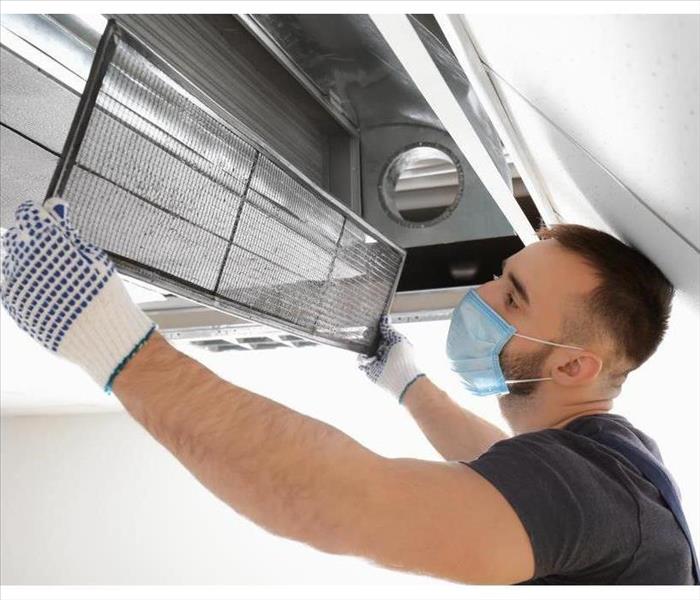 Keep your air ducts clean
Keep your air ducts clean
Four Steps For Cleaning Air Ducts
Maintaining a commercial property is a complicated job, and it gets even more challenging when you discover significant issues, like black mold growth. Mold does not always appear in common ways; sometimes, you may find hints of a mold problem peeking out from your facility's ductwork. There are at least four steps for cleaning air ducts.
Examine insulation
Sanitize the area
Assess the cause
Contact a specialist
Examine the Insulation
While eliminating mold from the inside of metal ductwork can be a simple task of cleaning and disinfecting, your job does not end there. You should inspect the insulation surrounding the clean ducts, ensuring that mold has not contaminated it. If you find mold, you will probably need to remove the majority of the surrounding insulation.
Sanitize the Area
Once you remove the contaminated insulation, you can move onto the cleaning process. All surfaces affected by the black mold will need to be disinfected and thoroughly cleaned. There are specific cleaners designed for sanitizing surfaces, but if you need help selecting an appropriate cleanser, you can contact a mold remediation company.
Assess the Cause
Beyond the discovery and removal of mold, finding out the cause is essential to eliminating the risk of recurrence. Inspect the surrounding area for signs of plumbing leaks or other water damage. If you do not find anything immediately around the ductwork, check the room closest to the most extensive mold growth, sometimes spores will travel into ductwork from the primary infestation.
Contact a Specialist
Mold should not be handled by people who do not understand the correct steps for removal and species diagnosis. If you are unfamiliar with mold removal, then it is likely best to contact a mold restoration company in Dacula, GA.
Finding black mold growth in your facility can be disheartening, but it is not the end of the world. Contact a professional service to help you remediate your concerns.
3 Common Sewage Issues Found in Commercial Buildings
9/9/2020 (Permalink)
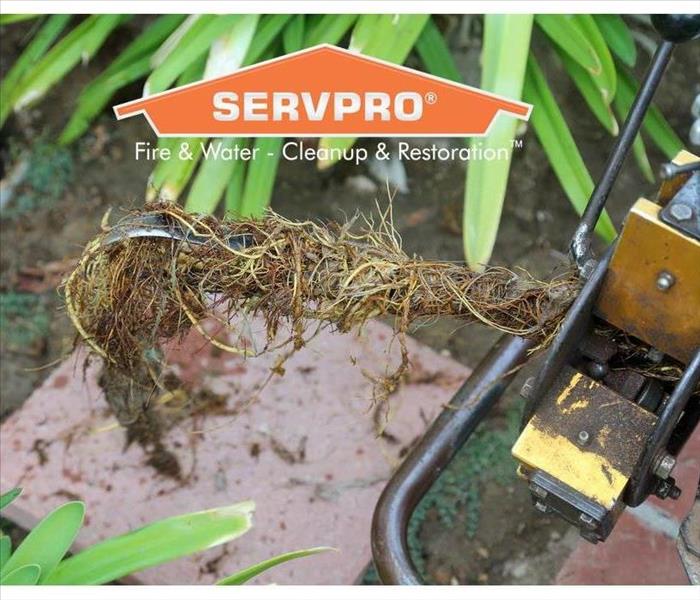 Tree roots growing in the sewer line is a common reason for sewer backup problems
Tree roots growing in the sewer line is a common reason for sewer backup problems
Here Are Three Common Issues
One of the biggest repair headaches for business owners in Rest Haven, GA, is when the plumbing goes awry. It's more common for these mishaps to occur in older buildings, but sewage disasters, such as a blocked sewer system, can happen at any place and time. Knowing the signs of an issue before it gets worse is key to saving your property and your bank account.
Here are three common issues. You'll want to know how to identify them before the problem is so large that you need to call the disaster pros.
1. Sewer Lines
Unfortunately, sewer lines aren't made to last forever. Cast iron sewer lines can last up to 25 years, which isn't long when you consider a building of that age is still fairly young. When a sewer pipe breaks there are several telltale signs, the most obvious being odor. Other telltale signs of a sewer line break would be regularly clogged drains and indentions in the landscape.
2. Blocked Lines
Sewer lines can also cause trouble when they become blocked. Unlike a break, you may have an opportunity to catch the problem before it causes damage. An obvious sign of a blocked sewer line is the sound of water bubbling. If you hear the sound of water bubbling, a toilet overflow is just waiting to happen, so act quickly at the first sign of a blocked line.
3. Tree Roots
While pipes will give out over time, their life can be cut short when tree roots force their way in. Tree roots can break and block sewer lines — the worst of both worlds. Fortunately, once you've identified the issue, you can take preventative maintenance precautions to make sure blocked sewer lines don't occur again.
Knowing the signs of impending and already occurring sewer issues can save you headaches and money. Be sure to check your insurance policy so that you know what sewer problems your coverage will handle should you run into one of these problems.
Preparing Your Business for a Hurricane or High Wind Event
9/9/2020 (Permalink)
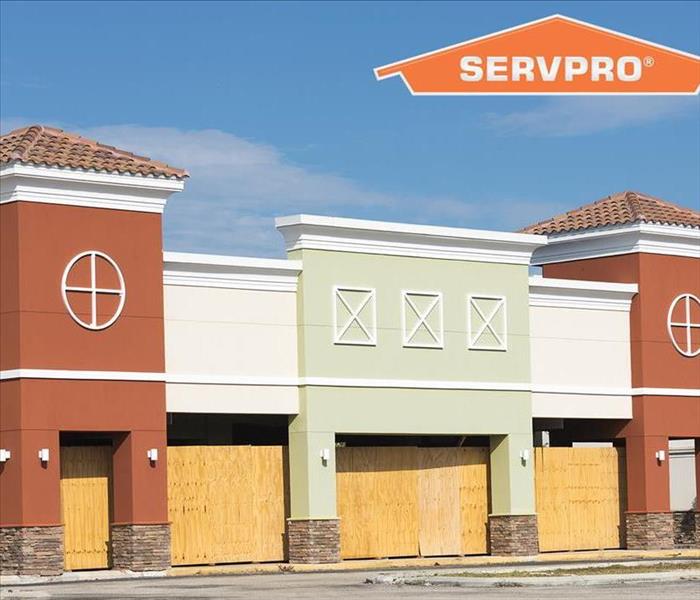 Board up building in Buford, GA
Board up building in Buford, GA
Ways To Prevent Storm Or Hurricane Damage From Your Business
If you own a commercial property in Buford, GA, you may be concerned about the possibility of sustaining damage during a high wind event. High winds, such as those caused by a hurricane, are notorious for wreaking havoc on valuable properties. There are, fortunately, a few things you can do to prevent storm or hurricane damage from hurting your business.
1. Be Prepared to For Power Failure and Isolation
You and your employees are the most important part of your business. This is why you should always have generators, blankets, food stocks, first aid kits, and other items on hand that make habitation easier during a disaster. Many preparatory items can also help you address building problems more quickly. Having working lighting, for example, can make it easier to spot a leak that needs to be addressed.
2. Protect Your Property
You should always regard everything you own as vulnerable to storm or hurricane damage. Any valuable documents should be backed up, and you should protect indispensable ones by waterproofing them. Raise electronics and appliances above ground level. Obviously, exterior surfaces like windows and doors are at the highest risk of storm damage. Purchasing shutters or carefully boarding up windows can protect them from debris made airborne by high winds.
3. Take Extra Precautions
Even if you have raised belongings and covered windows, it is still possible for property or items to sustain serious damage. Prepare for this possibility by sandbagging flood-prone areas and fastening furniture to wall studs. Before a storm makes landfall, utilities should be shut off so that any electronics still plugged in are safe from a power surge.
If your business has already suffered storm or hurricane damage, you should check if your insurance covers storm restoration. A restoration professional can expertly assess and remedy damage to structures, electronics, furniture, and other items. Although storm damage is often covered by insurance, it is always best to first prevent serious damage from occurring by taking appropriate precautions.
Commercial Pipe Burst Cleanup
8/24/2020 (Permalink)
A pipe burst cleanup can look overwhelming at first glance. If you have ever undergone a water cleanup before, then you know that this can be a stressful time. As a business owner, you may find that you are less overwhelmed if you understand the process behind the cleanup.
What Happens During a Pipe Burst Cleanup
- Safety First
You and the restoration company cannot begin pipe burst cleanup procedures until you take the proper safety precautions. Make sure the water is off so that no more can enter the building. Additionally, it may be a wise move to shut down the power. If there are any electrical outlets or appliances that have been soaked, you have to keep an electrical current out of there.
- Item Removal
Once you’ve taken care of safety, you can focus on what you can and cannot remove. Take everything that is salvageable outside to dry. You can clean all of your items outside of the building. Keep in mind that contents made out of porous materials can trap mold and mildew and should be thrown away.
- Water Extraction
The water extraction could go a number of different ways. If it isn’t too bad, then you can always mop up the water or use towels to soak it up. In some cases, the water cleanup may require you to use a more advanced strategy. If this is the case, you can use a pump to drain water.
- Drying and Dehumidifying
After you deal with a supply line leaking, you have to focus on drying out your business the best that you can. You can do this with fans and open windows. However, you can also purchase a dehumidifier. This will get rid of all excess moisture in the building.
A pipe burst cleanup can be difficult to undergo. However, it does not have to be stressful, and with professional assistance you can take care of a flood in Buford, GA quickly and easily.
Tips to Keep Your Home Safe When You Are Away
8/7/2020 (Permalink)
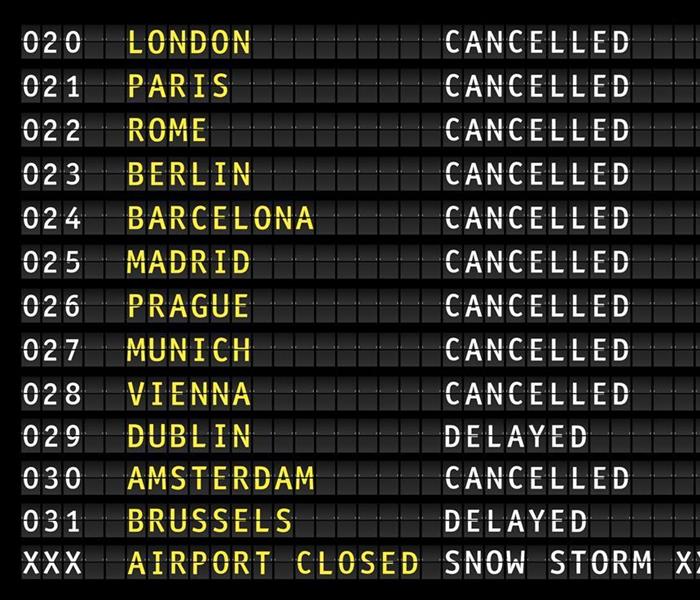 If your flight does get bumped, seek compensation from the airline
If your flight does get bumped, seek compensation from the airline
We all love vacations, but what happens if you become the victim of a canceled flight once it’s time to return? And what can you do to make sure your home in Sugar Hill, GA, stays safe in the event you become unexpectedly stuck abroad?
Making Your Flight
Travelers can reduce their chances of getting stranded in a foreign city by following a few simple rules:
- If possible, avoid booking a flight that may take place during your destination’s storm season. Weather-related apps can alert you to when storms are brewing, as well as provide other useful storm tips.
- Arrive at the airport early, allowing time for check-in, baggage check, security scans, and finding your gate. This process often takes longer than you may anticipate.
- Check your flight information, as departure details often change. Once you arrive at your gate, look twice to confirm that you are in the right place.
If your flight does get bumped, seek compensation from the airline. Be sure to book a hotel room sooner rather than later, as others have surely fallen victim to the same canceled flight or delay and local hotels may fill fast.
Protecting Your Home
Whether your absence is planned or not, you need to make sure your house remains secure. Provide a reliable neighbor or family member with a key so there will always be someone nearby to handle urgent situations. Place your mail on hold and don’t post your plans on social media; you never want to advertise your home’s vacancy to potential burglars. Likewise, have your residence fitted with a monitoring system that allows you to view your home from a phone or laptop. If you detect storm damage during your time away, you can contact a home repair specialist to resolve the issue before you even return.
Tourists will forever suffer from the occasional canceled flight, but commonsense preparation combined with prompt action can help assure that a homecoming never includes a nasty surprise.
Why Spend More on a Hygienist?
7/29/2020 (Permalink)
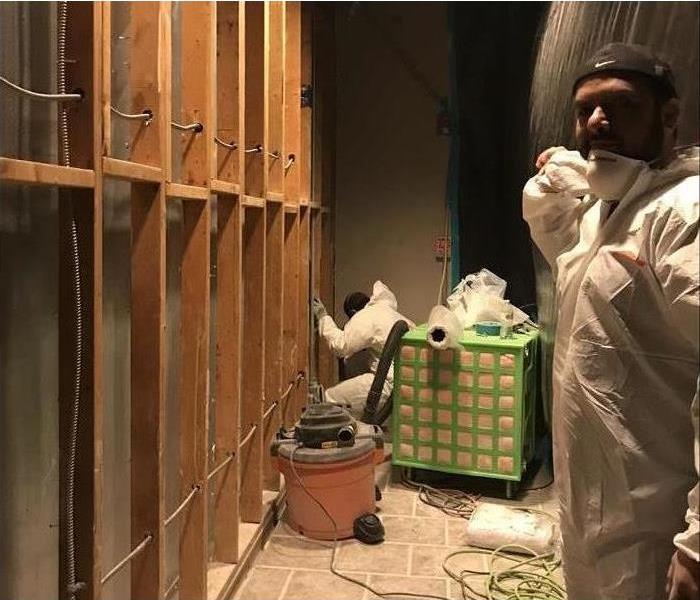 Mold cleanup in an Hamilton Mill, GA
Mold cleanup in an Hamilton Mill, GA
When you find mold in your Hamilton Mill, GA, home, you may take steps to clean it up and then assume that the problem has been handled. Unfortunately, mold damage goes much deeper than the surface. To get an accurate picture of how much mold cleaning is required, you need to know how widespread mold is in the unseen areas of your home, such as behind the drywall and under the carpeting and flooring. Professional hygienists are highly trained and have the right equipment to give accurate results that lead to effective mold cleaning.
The First Steps
One of the first steps in the mold remediation process is taking samples from the air and surfaces in your home.
This information provides important insights into preparing the best mold cleaning strategies. With the right information, the hygienist and mold remediation professionals can determine which equipment and supplies should be used, how long the cleanup process will take, and the best route for preventing future damage.
What's Next?
After putting together the plan for getting rid of and preventing future mold growth, the hygienist and the remediation professionals may tape off areas of your home to prevent mold spores from floating into unaffected areas. Technicians and hygienists may also wear personal protective equipment to limit the spread of spores. While these experts are working, you can make sure that children, pets, and other family members don't walk through the affected area.
Mold cleaning begins with an understanding of how far the mold has spread and what type of mold is in your Hamilton Mill, GA, home. Don't settle for cheap DIY tests; insist on results from a hygienist.
4 Things To Do After a Fire
7/9/2020 (Permalink)
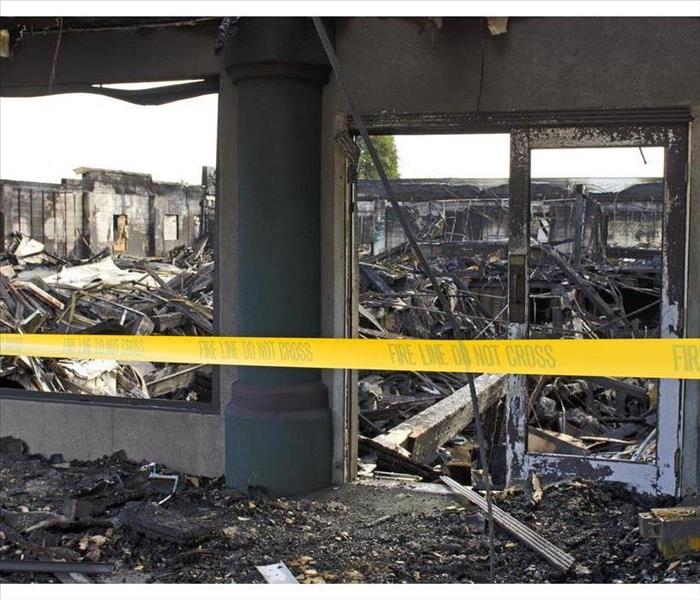 Secure the premises of your building after a fire
Secure the premises of your building after a fire
4 Things To Do After a Fire
When a company in Suwanee, GA, has suffered from fire damage, owners must determine how to best seek financial and physical aid. After all, the ashen walls and charred holes are not the representation of hard work and dreams, and surely commercial owners desire to see their place reopen. Fire restoration and insurance can be part of the solution, providing expertise and guidance on how to work. As you begin the collaborative process, proprietors should remember the following four things.
1. Contact Your Agent
The first step is to activate your fire insurance coverage. You'll want to call the office line, opening a claim. Allow the insurer to guide you through the process. During this time, ask them about your deductible, the limits, and expected procedures. Policies vary, and you don't want to forget a step. If possible, access your documentation online, and review it for full understanding.
2. Secure the Premises
Often flames can open holes within the structure, creating a security problem. To avoid any complications, you'll want to preserve the building as best as possible, avoiding trespassers, vandals, and environmental damage. Fire restoration companies can assess the area, help you secure the property, and board up exposed sections.
3. Have Inspections
Don't try to fix anything. You may think it's helpful to wash off walls or clean up carpets, but that could be problematic. Instead, have experts evaluate the need for smoke cleaning and water remediation. They may see issues that aren't immediately visible. Plus, their teams have special equipment to sanitize and repair.
4. Photograph Damage
Evidence is extremely valuable. You want to prove that your property suffered. Before you have anything replaced or changed, snap photos. Get up close, exposing the destruction. Save them to your computer in a file, labeling them with a date.
After a blaze, you'll have to force yourself to step back and go slow. Open a claim, patch up the building, and leave everything else alone. Fire restoration services can handle investigations and reconstruction.
The Advantages of Corporate Storm Restoration Services
6/12/2020 (Permalink)
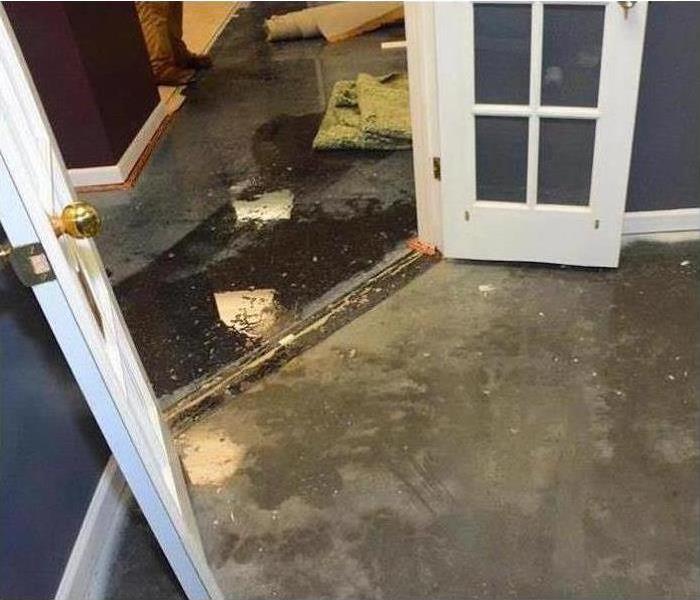 Water Damage from Storm
Water Damage from Storm
Storm damage can greatly devastate any business in Buford, GA. These clients deserve the best storm restoration services around. Specialists at SERVPRO use the inherent advantages of corporate help to serve insurance agents and their numerous clients. Learn about some of these features that benefit you and the businesses you serve.
Training and Experience
Bigger restoration companies employ professionals who have both the necessary training and experience to succeed in the field. They can handle the water and flood damage left behind by various natural disasters:
- Heavy storms
- Snowstorms and accumulated ice
- Hurricanes
- Tidal surges
- Tornadoes
These emergency situations are not the same and require different techniques and knowledge to treat them effectively. Water damage restoration technicians know how to take on each case and work with you to provide the best results. Business owners will be able to resume their operations thanks to this collaboration.
Fast Response
When it comes to storm restoration, time is of the essence. If water damage is left alone, it escalates and spreads throughout the location. The foundation and property inside weaken and break. Excess humidity encourages the growth of mold and mildew, making the area increasingly uninhabitable for employees and customers. Corporate storm response prevents these problems and additional costs by addressing the concerns of the business owners as fast as possible.
Equipment and Other Resources
Storm damage recovery involves the use of sophisticated equipment for cleaning and repair. Large companies with decades on the field use the latest equipment to help clients, reducing the costs and risks of buying and operating that equipment without expertise. Additionally, corporate remediation companies such as SERVPRO have locations across the country, ensuring that establishments everywhere receive the finest nearby assistance without any delay.
When a water-based disaster such as a storm or a flood strikes, your clients need the best assistance in the business. Corporate storm restoration services have the necessary personnel and resources to resolve problems in a timely manner.
How To Keep Mold Away in Humid Climates
5/14/2020 (Permalink)
There are some things you never want to see in your office building. Mold is one of them. This pesky invader can find its way into the office and grow rapidly under the right conditions. Mold thrives in high humidity, so if your office is located in a humid climate, or if there are moist environments in your workplace, there is a higher risk of mold appearing and spreading. Fortunately, you can take some steps to keep this fungus at bay.
Keep it Clean
Mold loves dirt and grime. Cleaning the most visible areas of your Sugar Hill, GA, office is not enough to prevent mold damage. You need to get into every nook and cranny of the building to ensure it's clean. Make sure your cleaning crew is doing the following:
- Vacuuming carpet thoroughly each night
- Sanitizing all surfaces and contact points, including door handles, light switches, and desks
- Dusting tables, walls, cubicles and vents
Inspect After Storms
An area with high humidity is prone to mold issues. Any moisture in the office will increase the likelihood of mold growth. If a heavy rainstorm hits the area, check windowsills, doorways, and the building's foundation for water. If you notice any, make sure you clean it up promptly.
Maintaining Good Airflow
Mold spores love when there is a lack of ventilation. Your office should have good air circulation to keep away mold. Ensure that nothing is covering the vents in the building. Open windows on days when the weather permits it. Install and maintain exhaust fans in bathrooms, kitchens, and laundry rooms. Have a professional inspect and clean the air ducts in the building. This will keep air moving properly and efficiently. Sometimes you can avoid the need to call professional mold remediation specialists to do mold clean up if you prevent stagnant air in the building.
High humidity can invite fungal growth. The good news is you can maintain a mold-free environment by following these guidelines.
3 Reasons Not To Drive on Flooded Streets
5/1/2020 (Permalink)
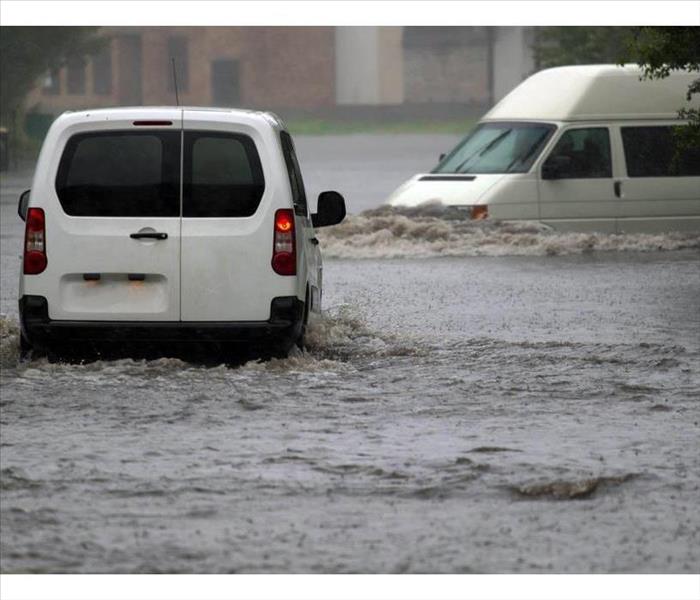 It is better to turn around, rather than take a chance on driving
It is better to turn around, rather than take a chance on driving
Three Reasons Not To Drive Through Floodwaters
The temptation to drive down a flooded street can be difficult to resist for many drivers. You have somewhere you need to be and you do not want to waste time looking for a way around. It is just a little bit of water and you do not think it looks that dangerous. However, floodwaters can be deceiving. These are three of the reasons you should not drive through floodwaters.
1. It Could Be More Dangerous Than You Think
Six inches of water on a flooded street can be all it takes to cause a vehicle's tires to lose traction, resulting in a loss of control of the vehicle. 12 inches of water can cause most vehicles to float, which can lead to the vehicle being swept off the road. It can often be difficult to visually judge the depth of floodwaters. For this reason, it is better to turn around, rather than take a chance on driving through what you think is a safe amount of water.
2. You Could Drown
According to the CDC, more than half of all flood-related drownings occur when people attempt to drive down flooded roads. In addition to putting the passengers in your vehicle at risk, first responders or bystanders who may attempt to assist you are also at risk of drowning.
3. Your Vehicle Could Be Destroyed
Driving through standing water can damage your vehicle's engine, brakes, power steering, and electrical systems. Even shallow waters can be sucked into your vehicle's engine, causing severe damage.
The dangers of driving down a flooded street are easy to misjudge and can result in the loss of your vehicle or even your life. In most situations, it is better to turn around and find another route to where you are going than to risk driving through floodwater. If you are experiencing flooding in Suwanee, GA, consult your local Department of Transportation for travel tips and consider contacting flood remediation specialists to assist you with any flood damage to your home.
What To Look For In a Mitigation and Restoration Service
4/21/2020 (Permalink)
 SERVPRO of Buford / Suwanee / Hamilton Mill offers board up services
SERVPRO of Buford / Suwanee / Hamilton Mill offers board up services
Select a Firm That Meets All of These High Standards
A single service can mitigate and restore commercial property damage in Buford, GA. If you decide to rely on the same company for fire damage recovery from start to finish, select a firm that meets all of these high standards.
Short Response Times
Commercial property owners should rely on a service that responds to reports of damage 24 hours a day, seven days a week. Look for a mitigation and restoration company that offers the following services:
- Immediate response
- Nearby restoration franchise locations
- Boarding up and roof tarping
- IICRC-approved cleanup methods
A local or regional franchise can be a better choice than an independent mitigation and restoration service provider. Larger companies guarantee trained staff and the availability of equipment for mitigation and cleanup.
Detailed Estimates
A company that performs mitigation and restoration is prepared to provide a detailed estimate of the total cost of services. Fire mitigation costs may include boarding-up or tarping followed by the cleanup and restoration of water, fire and smoke damage. An insurance adjuster should be able to access estimates, documentation of damage and an itemized list of losses.
Water and Fire Damage Cleanup
Damage cleanup should commence as soon as possible. A commercial structure that has sustained water damage from fire suppression may need to be pumped out and the affected area will need to dry prior to cleaning.
Complete Restoration
A service that handles every stage of damage recovery from water and fire cleanup to restoring smoke damage can provide an accurate estimate at the start of the process. Relying on a single service makes it easier to stay on schedule and ensure that all mitigation, cleanup, and restoration measures are held to the same high standard.
A one-stop shop is the best choice for restoring fire damage at a commercial property in Buford, GA. Simplify the claim-making process by contacting a preferred provider of mitigation and restoration services.
3 Keys for a Home Without Mold
3/27/2020 (Permalink)
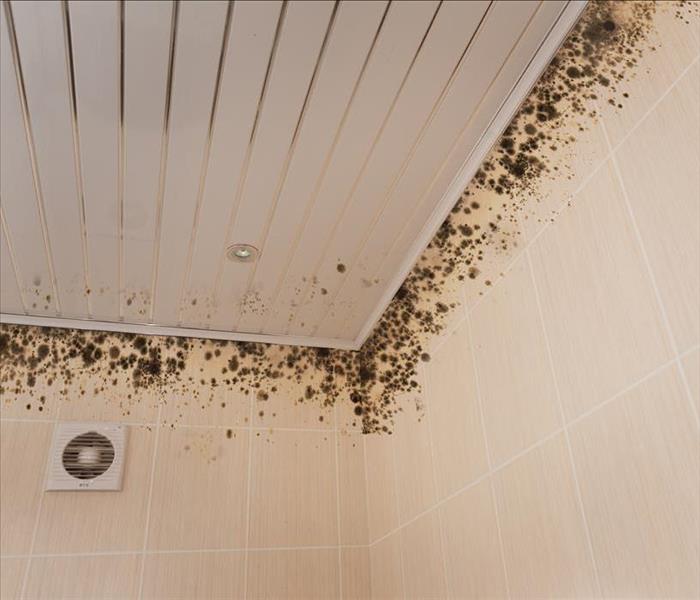 Check the ceiling and tiles for the presence of mold colonies
Check the ceiling and tiles for the presence of mold colonies
3 Keys for a Home Without Mold
Mold and mildew in your home in Dacula, GA, brings an assortment of problems. To begin with, a case of bathroom mildew is not a pretty sight, and it also comes with a musty odor. Plus, it can cause harm to bathroom tiles, flooring, shower curtains and other items. The microscopic spores of various types of mold sometimes irritate humans and even cause allergy symptoms. Since moisture is the most likely cause of mold in a home, it pays to be vigilant against leaks, plumbing issues, and flooding. Here are three more items that you can do as a homeowner to decrease the likelihood mold will pay you an unwelcome visit.
1. Choose air conditioning over a swamp cooler. Swamp coolers are an efficient form of cooling for people living in warm and dry areas, but they can create a humidity problem. Regular maintenance of the unit can help reduce issues. If you operate a swamp cooler, make sure the humidity in rooms stay below 45 percent. Air conditioning units seldom cause similar issues, and they often have controls that can lower humidity levels.
2. Check for moisture in the bathroom. With all of the faucets, sinks, and drains, a bathroom is a prime location for mold growth. To prevent bathroom mildew, make sure there are no leaking pipes or areas of standing water. Check the ceiling and tiles for the presence of mold colonies which typically show up as dark spots.
3. Call in a mold remediation franchise. If you suspect the presence of mold in your home, call in the professionals. A company that has training and the right equipment can quickly detect the presence of mold and come up with a plan to defeat it. With the use of air scrubbers, HEPA vacuums, and cleaning agents, an experienced company can get mold under control, even a stingy case of bathroom mildew.
We are Cleaning Experts
3/20/2020 (Permalink)
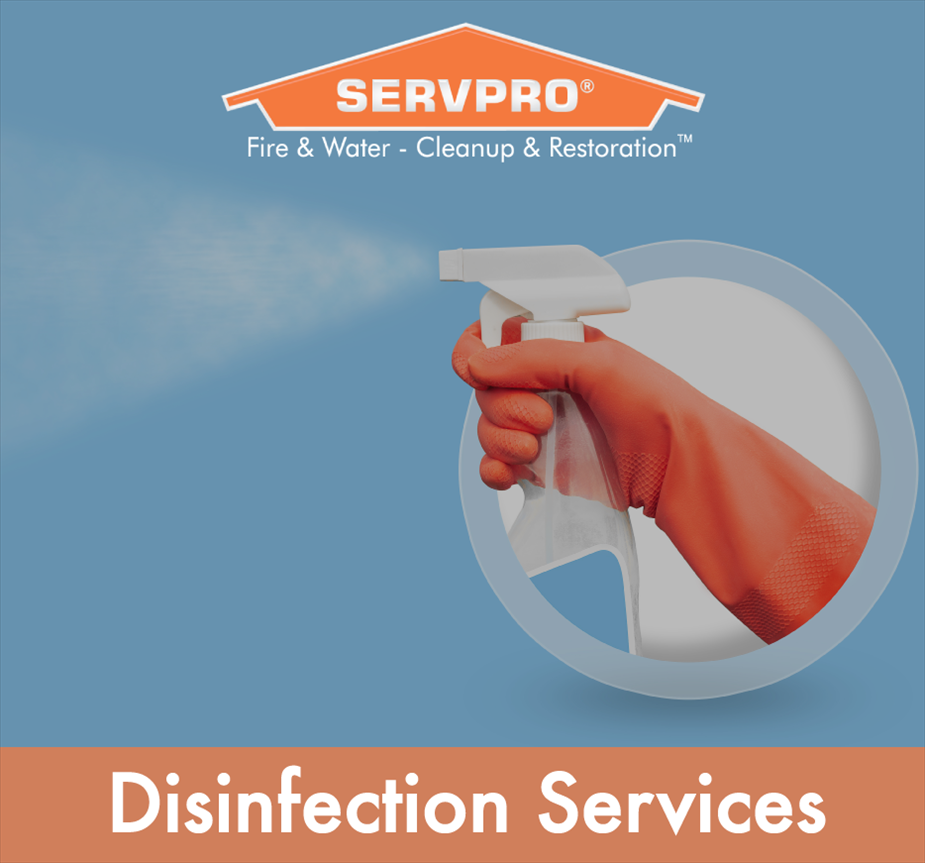 We can handle any commercial or residential sanitization job
We can handle any commercial or residential sanitization job
SERVPRO is Here to Help during this time of need
During this unprecedented time caused by the global pandemic of coronavirus, this is a reminder to our customers that we are specialists in cleaning services, and we adhere to the highest cleaning and sanitation standards.
Specialized Training
We are prepared to clean and disinfect your home or business, according to protocols set forth by the Centers for Disease Control and Prevention. We have years of experience in dealing with biological contaminants, and we will go beyond the scope of work that regular janitorial staff perform on a daily basis.
The CDC encourages cleaning of high-touch surfaces such as counters, tabletops, doorknobs, light switches, bathroom fixtures, toilets, phones, keyboards, tablets and tables. Other spaces mentioned in the CDC’s guidance for commercial spaces include:
- Kitchen/Food Areas
- Bathrooms
- Schools/Classrooms
- Offices
- Retail Spaces
- Water Fountains
- Shelving/Racks
- Sales Counters
- Carpets and Rugs
- Stair Handrails
- Elevator Cars
- Playground Equipment
- Fitness Equipment
Specialized Products
The CDC recommends usage of a labeled hospital-grade disinfectant with claims against similar pathogens to the coronavirus. Multiple products in the SERVPRO product line carry the EPA-approved emerging pathogens claims. While there is currently no product tested against this particular strain of the coronavirus, we are following all guidelines as provided by the CDC and local authorities.
Call Today for a Proactive Cleaning
If your home or business needs deep cleaning services, call the experts today – SERVPRO of Buford/Suwanee/Hamilton Mill, (770) 945-5355





 24/7 Emergency Service
24/7 Emergency Service





























































